Parenting is a rewarding yet challenging journey that often brings its share of stress and frustration. If you’ve ever felt overwhelmed by anger, you’re not alone. To help you navigate these emotions, I excited to offer a workshop titled “Cultivating Calm: Anger Management Strategies for Parents.”
This workshop is designed to equip you with practical tools and techniques to manage anger effectively, fostering a more harmonious home environment.
What You’ll Gain:
Understanding Anger: Anger is a natural emotion, but when it becomes frequent or intense, it can strain your relationships and well-being. Learn about the nature of anger, its psychological and physiological triggers, and how it impacts both you and your children.
Identifying Triggers: Discover the specific situations or behaviours that set off your anger and how to recognize them early. This self-awareness is the first step in preventing anger from spiralling out of control.
Developing Coping Strategies: Master evidence-based techniques such as deep breathing, mindfulness, and progressive muscle relaxation to manage anger in the moment and reduce its frequency over time.
Improving Communication: Enhance your ability to express your feelings calmly and constructively, leading to better family interactions. Effective communication can prevent misunderstandings and reduce the likelihood of anger.
Promoting Emotional Intelligence: Foster emotional intelligence in yourself and your children to better handle emotions and stress. Teaching your children about emotions can help them develop healthy coping mechanisms.
Join us to transform how you handle anger and create a calmer, happier home. Sign up today for “Cultivating Calm: Anger Management Strategies for Parents” and take the first step towards a more peaceful parenting experience.
A Parent Workshop on learning ways to manage anger
Date: Thursday, June 13, 2024 (09:00-10:00)
Location: IBSB School Cafeteria
Presenter: Cristina Latcu, IBSB Secondary School Student Counsellor
Registration: https://forms.office.com/e/V0xDPmWSSA
In a school as diverse and dynamic as ours, conflicts are bound to arise from time to time. Whether it’s a disagreement among students, or even issues involving parents, conflict is a natural part of human interaction. The key to maintaining a positive and harmonious school environment lies in how we address and resolve these conflicts.
In this edition of our newsletter, we’ll explore practical strategies for conflict resolution that can help us build bridges and strengthen our school community.
1. Open and Respectful Communication
The foundation of resolving conflicts lies in open and respectful communication. I encourage students, staff, and parents to express their concerns and feelings in a calm and constructive manner. This can be achieved through active listening, maintaining eye contact, and acknowledging each person’s perspective. By fostering an atmosphere of trust and understanding, we can pave the way for effective conflict resolution.
2. Mediation
Mediation is an invaluable tool for addressing conflicts in a non-confrontational manner. In this approach, a neutral third party, such myself as counsellor, helps facilitate a conversation between the parties involved. Mediators guide the discussion, ensuring that all parties have an opportunity to express themselves and work together to find common ground.
3. Empathy and Perspective-Taking
Encouraging empathy and perspective-taking can be transformative in resolving conflicts. By putting oneself in the shoes of others, you can better understand their feelings and motivations. This can lead to greater compassion and the ability to find mutually agreeable solutions. Teachers can incorporate exercises that promote empathy in the classroom to help students develop this valuable skill.
4. Restorative Practices
Restorative practices focus on repairing harm caused by conflicts and restoring relationships. Rather than simply punishing individuals, this approach encourages those involved to take responsibility for their actions, make amends, and find ways to move forward positively. It’s a transformative approach that fosters healing and growth.
5. Collaborative Problem-Solving
In many conflicts, there is a shared goal of finding a solution. Encourage all parties involved to work together to identify common objectives and brainstorm strategies to achieve them. This collaborative approach can empower everyone to be part of the solution, rather than perpetuating the problem.
6. Respect Diversity and Inclusion
In our diverse school community, it’s crucial to respect and celebrate our differences. Encouraging an inclusive and welcoming atmosphere fosters respect among individuals with various backgrounds and perspectives. This, in turn, can reduce conflicts related to prejudice or misunderstanding.
By incorporating these strategies into our school’s culture, we can proactively address and resolve conflicts while promoting understanding, empathy, and harmony within our community. Conflict is a natural part of life, but how we deal with it defines the strength of our relationships and our school community as a whole. Let’s continue to build bridges, not walls, in our quest for a more peaceful and united school.
I look forward to working together to make our school a place where conflicts are opportunities for growth and understanding.
Some researchers suggest that the belief and at times pressure to always be happy can work to undermine our lives. This is because life is a combination of both pain and pleasure, so if we attempt to eliminate pain by seeking constant pleasure or distracting ourselves from it, we miss out on the opportunity to experience, accept, and transform it into something more.
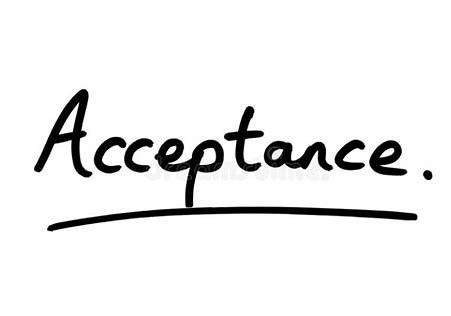
All emotions are natural responses and interconnected
It is important to recognise that when we try to suppress negative emotions, we remove positive emotions as well. Before children are exposed to a culture that prioritizes pleasure through material possessions, they have a better understanding of what truly satisfies them – connection. This connection involves feeling understood, acknowledged by their parents and caregivers, as well as finding meaning and coherence in their surroundings.
In order to foster this sense of being understood, children require us to accept and validate all their emotions, including anger, fear, sadness, and joy. However, we can only effectively do this if we are in touch with our own emotions.
Distracting away from feelings
Distraction is a strategy often adopted by parents to redirect their children from their current experiences. While it is a commonly used approach, it is seldom the most suitable choice. This is because distraction involves manipulation, which in the long run won’t contribute to your child’s ability to find happiness.
When you consistently use distraction to steer your child away from their feelings or experiences, you inadvertently hinder their capacity to focus. Consider it this way: when your child gets hurt, has their feelings bruised, or encounters disappointments, using distraction to divert them from their emotions rather than assisting them in processing those feelings discourages them from maintaining their attention during challenging situations. You certainly wouldn’t want your child to easily lose focus when faced with difficult tasks.
One of the reasons you may find it tempting to downplay a child’s emotional experience by distracting them or invalidating their feelings is because you’re viewing the situation from your point of view, not theirs. A baby naturally experiences emotions without control. As a child matures, they can gradually learn to observe and manage their feelings, but they cannot do this in isolation. They require someone to acknowledge and support as they navigate their emotional growth.
In our strong desire to manage our children’s happiness, there are times when we inadvertently push them away when they are angry or sad. However, for optimal mental well-being, children need their emotions to be acknowledged, with guidance on expressing their feelings in socially accepted ways- a need that extends to adults as well.
Consequently, it’s crucial to acknowledge our own emotions rather than suppressing them and equally important to accept our children, whatever emotions they may be experiencing.
By assisting a child in expressing their feelings through words (or art), we aid them in processing those emotions and finding constructive ways to communicate their inner world.
The International British School of Bucharest (IBSB) was established in 2000, and now has around 480 students from over 20 nationalities. IBSB is a 3-18 all through school, with the secondary school making up the significant part of the school roll. All students follow the National Curriculum for England and Wales, which prepares them for GCSE, IGCSE, AS and A Level examinations. Graduates from IBSB have been accepted into some of the most prestigious universities in the UK, the USA and Europe. IBSB offers a broad and diverse GCSE and A Level programme, including subjects such as classical studies.
In terms of inspection, IBSB was rated as “Excellent” in September 2022, in what was its most recent British Schools Overseas (BSO) inspection by the Independent Schools Inspectorate (ISI). IBSB has also been accredited as a World Class School by High Performance Learning (HPL), which recognised that “the International British School of Bucharest is a wonderful school with children at the centre of everything they do. They are a risk-taking team and driven by success at every opportunity.” IBSB is also an active member of COBIS, HPL Fellowship of World Class Schools and the Association of British Schools Overseas (AoBSO).
How does Alps culture of aspiration fit with IBSB?
As mentioned previously, IBSB is a World Class school within the HPL framework. HPL is a research-based philosophy that states all students have the potential to be high performing and not limited by ability. The HPL framework is teaching and learning based, which aims to grow and develop cognitive skills. Schools should strive to continuously improve, and the decision should be made to utilise the HPL framework to give structure to the maintenance of a growth mindset. At IBSB, we believe that all pupils have the ability to perform and achieve at the highest levels and should strive for success. Using Alps to generate the data and the targets, and track the progress that students are making, allows this aspiration in many cases to become reality.
Using Alps in an international school setting
I was introduced to Alps through a conversation with other senior leaders of schools that were going through the accreditation process of becoming HPL schools. This led to a conversation with Simon O’Connor of Jumeirah College, regarding the impact that Alps had on his setting in the UAE. One of the issues that we often have in an international setting is the availability of prior attainment data that you would have in a UK school, such as KS2 SATS data or FFT data. The ability to be able to use GL assessment CAT4 data in the Alps platform, Connect, to generate a minimum expected grade (MEG) for a student in year 10, that will act as a target that progress can be measured against, was a game changer as far as we were concerned as a school. This allowed us to demonstrate to pupils, parents and teachers exactly what the minimum expectations could be for a student and, extrapolating forward, for a class of students in a particular subject. From this, more aspirational targets can be negotiated.
How do we use Alps at the International British School of Bucharest?
At IBSB, all pupils in years 7, 10, and 12 take the CAT4 assessment from GL assessment. In years 7 to 9 this CAT4 data is used to generate a target grade in every subject. When pupils move into KS4 the CAT4 assessment is taken again and the CAT4 data is then uploaded to Alps, where a Minimum Expected Grade (MEG) is generated. This MEG is aspirational and is based upon the CAT4. Teachers will then use the data from previous years, along with conversations with the student to set an aspirational, personalised target (PT) which is reviewed regularly.
In KS5, the results obtained at IGCSE/GCSE are used to generate a point score, which then generates the MEG for A Level. Again, conversations take place between students and teachers regarding personalised targets, and these targets are regularly reviewed over the course of the two years to ensure that they remain aspirational and relevant.
How does Alps help teachers and students?
Alps has been invaluable in allowing staff to be able to track the progress of pupils within their subject areas and to allow middle leaders and senior leaders to be able to identify areas of strength and areas of development within subject areas, and within the school as a whole. As a World Class HPL school, our philosophy is that “all pupils are capable of high performance” and Alps, and in particular Connect, allows all staff at IBSB to be able to use the data that has been generated through classroom assessment and reported on, to be able to see how pupils are progressing, not just in one subject, but in all subjects that are being taken.
Senior leaders use Connect to set targets for middle leaders related to subject T scores, with departments being set challenging targets to achieve Alps scores of 1 to 3. An Alps score of 1 means we are exceeding the top performance in the Alps benchmark, a score of 2 means we are matching the performance at the top 10% and a score of 3 means we are matching the performance of the top 25% against the Alps benchmarks. Middle leaders then have similar conversations with subject teachers relating to T scores for the class, the progress that students are making to their aspirational targets and the impact that can be had through intervening with students who are working below targets set.
This reporting data is used by the KS4 and KS5 coordinator who can then cross reference with GL PASS data to see how pupils are feeling about school and also how this has impacted on their progress, looking at the bigger picture. Staff feedback has been universally positive about the ease of use and simplicity of Connect, especially the thermometer!
Impact of Alps
Since IBSB began using Alps in 2020, a T score of 4 or above has been maintained at A Level, with a score of 1 in 2020-21. History, economics and geography have maintained scores of 3 or above during this time. At AS Level, the T score has been 1 for every year that IBSB has been using Alps, with physics, mathematics, psychology and economics attaining a score of 2 or above in each year.
Obviously, the grades achieved by the students cannot be attributed to Alps, but the ability to identify students who are underachieving and then be a tool to promote conversation between colleagues and also between students and teachers is invaluable. Alps keeps students honest and also develops accountability, as well as starting conversations related to whole school development, allowing schools to continually strive to be their best, which is true high-performance learning in action.
As the exam season approaches, it’s perfectly normal to feel a mixture of excitement and anxiety. You’ve been preparing diligently for this moment, and the time has finally arrived. It’s essential to remember that success isn’t just about what you know, but also how well you can handle the pressure and stress that comes with exams. In this newsletter article, we’ll explore the concept of building exam resilience to help you thrive during this crucial period.

What is Exam Resilience?
Exam resilience is the ability to bounce back from setbacks, manage stress, and stay focused during the exam season. It’s about being emotionally and mentally prepared to handle the challenges that come with exams. Building resilience is a skill that will not only help you perform better academically, but will serve you well throughout your life.
Here are some strategies to help you build exam resilience:
1. Effective Study Techniques: Start with a study plan that includes regular breaks and varied study methods. Utilize active learning techniques like summarizing, teaching the material to someone else, and self-quizzing. These strategies will help you understand and retain information more effectively.
2. Time Management: Allocate your study time wisely. Make a schedule that allows you to cover all subjects while ensuring you get enough rest. Procrastination can increase stress, so try to manage your time efficiently.
3. Stay Active: Regular physical activity is a great stress buster. Whether it’s a short walk, a yoga session, or a game of your favourite sport, exercise can help clear your mind and boost your mood.
4. Mindfulness and Relaxation: Practice relaxation techniques like deep breathing, meditation, or mindfulness exercises. These can help reduce anxiety and improve concentration.
5. Healthy Eating: A balanced diet with lots of fruits, vegetables, and whole grains can positively impact your energy levels and concentration. Don’t skip meals, and drink plenty of water to stay hydrated.
6. Seek Support: It’s okay to seek help from teachers, parents, or counselors if you’re struggling. They can offer guidance and support to help you overcome challenges.
7. Stay Positive: Maintain a positive attitude and believe in yourself. Visualize success, and remember that you’ve prepared for this moment. Self-doubt can be a significant source of stress, so practice self-compassion.
8. Practice Past Papers: Working on past exam papers can help you become familiar with the format and types of questions. It also builds your confidence and helps you identify areas that need more attention.
9. Sleep Well: Ensure you get enough rest. Lack of sleep can affect your memory, concentration, and overall well-being. Aim for 7-9 hours of quality sleep each night. Research shows that insufficient sleep can impair exam performance by as much as 30%, so plan to finish you exam prep a few days before the exam to ensure you get a few nights good sleep before the exam
10. Stay Balanced: While exams are important, remember that your well-being is paramount. Take time for your hobbies, interests, and social interactions to recharge your mind and spirit.
Building exam resilience is about equipping yourself with the mental and emotional tools to face the challenges of exams. With these strategies in mind, you can navigate the upcoming exam season with confidence and poise.
Remember, the process of learning and personal growth is just as important as the grades you receive. Stay positive, stay focused, and stay resilient, and you’ll be well on your way to success.
I wish you the best of luck! You’ve got this!
Healthy habits are the basis for success in any field, from becoming a world-class athlete or businessman to reaching your academic potential. Such habits are not magically built overnight, but require a select number of steps to be implemented most efficiently. The book Atomic Habits by James Clear outlines the four main steps required to adopt any practice, those being making it: obvious, easy, attractive, and satisfying.
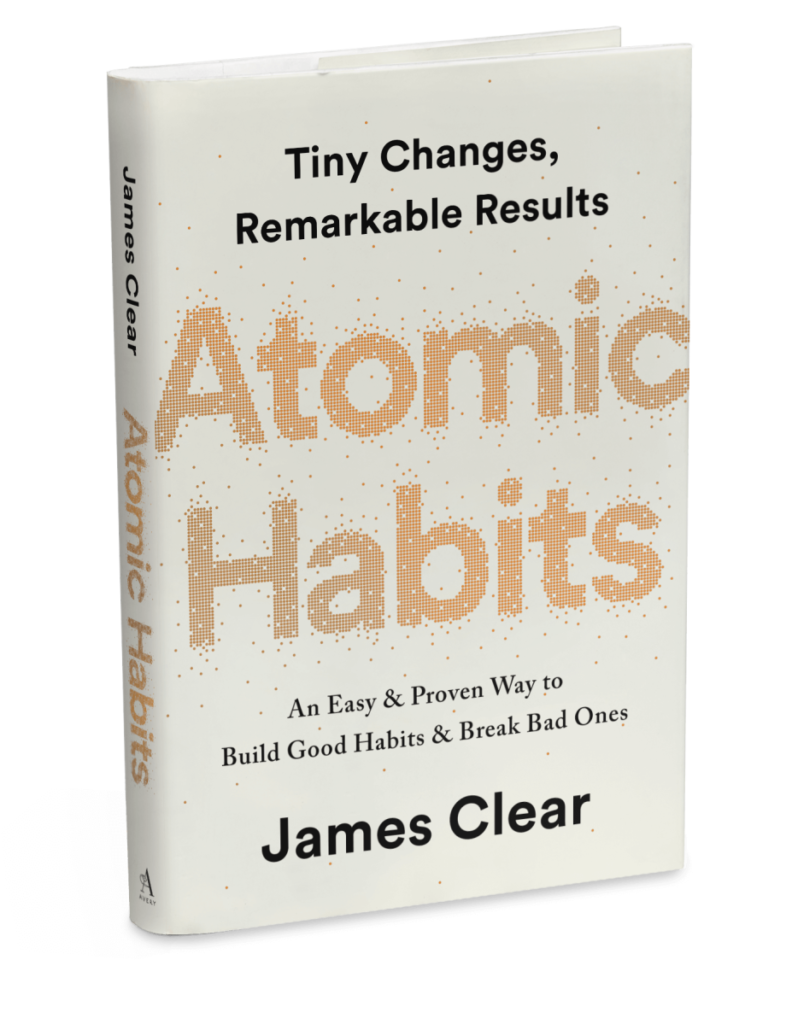
Making it obvious:
The easiest way to make a habit obvious is to connect it with a pre-existing habit. This can be done through the creation of a habit stack.
With habit stacking, all you say is: After [current habit], I will [new habit]. For example:
● After I pour my morning coffee, I will read the news for 1 minute
● After I get into bed, I will read for 5 minutes
● When I start to [make myself a plate of food], I will put vegetables on first
Making it easy:
In order to build a habit, you need first to start off small and then build up progressively. James Clear uses the term ‘ Habit Shaping’ to explain how to work your way up to big goals. You simply take a goal (which we’ll identify shortly) and break it down into a series of smaller habits that will lead there. This is the case as it is inhuman to, for example, want to start reading for 2 hours if you are not used to reading before.

Making it attractive:
Humans are naturally drawn to activities that provide immediate pleasure and satisfaction. Therefore, in order to create a long-lasting habit, you should make it as attractive as possible. This can be done by rewarding yourself after completing a habit or by pairing it with something you already enjoy.
Use Temptation Bundling:
This technique involves pairing an enjoyable activity with a habit you want to cultivate. For example, listening to your favourite podcast only while exercising can make working out more attractive.
Making it Satisfying:
Clear argues that the more satisfying an experience is, the more likely you are to repeat it. This means that in order to try to pursue a habit actively, you need to make it as satisfying as possible—however, Clear cautions against rewards that directly contradict your new habit. So, ice cream wouldn’t be a good reward for eating a healthy meal. But it could be a fine reward for reading more books, making sales calls, or any non-health-related goal. You can achieve this by:
Celebrating Small Wins:
Acknowledge and celebrate your achievements, even if they seem insignificant. Celebrating small milestones can create a positive feedback loop that keeps you motivated.
Using Immediate Rewards:
Make sure there is an immediate payoff for completing a habit. This provides a sense of satisfaction and reinforces the behaviour. For example, if you’re trying to read more, reward yourself with a small treat afterwards.
Avoid Breaking the Chain:
Maintain a streak of successful habit completions. The longer the chain, the more satisfying it becomes to keep it unbroken, which can help reinforce the habit.
I wish you the best in your journey to create good habits and recommend that you read AtomicHabits in order to get an even greater understanding of the process.
Sibling rivalry is a common phenomenon in many households, and while it’s a natural part of growing up, it can be a source of frustration and tension for both parents and children. Understanding the underlying causes and employing effective strategies can help foster healthy relationships and harmony within the family on the long term.
Understanding the roots of sibling rivalry
Sibling rivalry stems from a variety of factors, including competition for parental attention, differences in temperaments and personalities, and a desire for independence. As children grow and develop, they may struggle to assert their individuality within the family dynamic, leading to conflicts with their siblings. Here are a few suggestions to bring more calm to your house:
Each child is unique with their own set of interest, talents, and strengths. Encourage and celebrate their individuality by providing opportunities for them to pursue their own hobbies and interests. This helps foster a sense of self-worth and reduce the need for competition.
Open and honest communication is crucial in any relationship, including that of siblings. Encourage your children to express their feelings and concerns, and actively listen to what they have to say. This creates an environment where they feel heard and understood, which can lead to stronger bond between siblings.
Establish clear and consistent expectations for behaviour within the family. Clearly communicate the rules and consequences, ensuring that they apply to all children. This promotes a sense of fairness and reduces the likelihood of jealousy or resentment.
Helping your children develop healthy conflict-resolution skills is an invaluable tool for navigating sibling rivalry. Teach them techniques such as active listening, expressing feelings without blame, and finding compromises. These skills will serve them well in their interactions not only with their siblings, but in all areas of their lives.
Encourage your children to put themselves in their sibling’s shoes. Help them understand that their siblings have their own challenges and feelings, and that empathy and support are crucial for maintaining a strong family bond.
Comparing one child to another can breed resentment and intensify rivalry. Instead of highlighting their differences, focus on their individual accomplishments and strengths. This helps each child feel valued and appreciated for who they are.
Balancing individual attention with family time is essential. Plan activities that the whole family can enjoy together, fostering a sense of camaraderie and shared experiences. These moments can create lasting and strengthen sibling bond.
Children learn by example, and observing healthy interactions between parents and other family members can positively influence their own behaviour. Demonstrate effective communication, empathy, and conflict resolution skills within your own relationships.
Conclusion
Sibling rivalry is a natural part of family life, but it doesn’t have to be a source of constant conflict. By understanding the underlying causes and employing effective strategies, parent can help their children build stronger bonds with their siblings. Encouraging individuality, open communication, conflict resolution skills, and patience, consistency, and love, families can create an environment where their children can grow and thrive together.
Nurturing Healthy Friendships
In a world of unprecedented change across multiple fronts, there is one thing that remains constant: the importance of building healthy friendships. As our children navigate the challenges of adolescence, it is crucial that they equip themselves with the skills needed to cultivate and maintain these meaningful connections. Here are few helpful suggestions:
1. Be Your Authentic Self
Friendship begins with authenticity. It’s vital to be yourself and embrace your uniqueness. Authenticity attracts like-minded individuals who appreciate you for who you truly are. Remember, it’s okay to have quirks, interests, and passions that make you stand out. Embrace your individuality and celebrate it!
2. Open and Honest Communication
Healthy friendships thrive on open and honest communication. Share your thoughts, feelings, and concerns with your friends, and encourage them to do the same. Listening actively and empathetically is equally important. When both sides feel heard and understood, bonds become stronger.
3. Establish Mutual Respect
Respect is the cornerstone of every healthy friendship. Treat your friends with kindness, empathy, and understanding. Respect their boundaries, opinions, and decisions, even when they differ from your own. In return, you’ll receive the same respect and trust.
4. Build Trust Gradually
Trust is something that develops over time. Be patient with the process and give your friends the opportunity to earn your trust. Keep your promises and be reliable to show your commitment to the friendship.
5. Resolve Conflicts Positively
Disagreements and conflicts are a natural part of any relationship. Instead of avoiding them, learn to address conflicts positively. Communicate your concerns calmly, listen to your friend’s perspective, and work together to find a solution that respects both parties’ feelings.
6. Nurture Common Interests
Shared interests and activities can be a great foundation for friendships. Participating in clubs, sports, or hobbies that you both enjoy can create opportunities for bonding and shared experiences.
7. Be Inclusive
Inclusivity is a crucial aspect of friendship. Be open to making new friends and including others in your circle. You never know when you’ll meet someone who brings a unique perspective to your life.
8. Support and Empower Each Other
True friends lift each other up. Celebrate your friends’ achievements and be there for them during tough times. Offer encouragement and empower your friends to pursue their dreams and aspirations.
9. Healthy Boundaries
Establishing healthy boundaries is essential to maintain balanced and respectful friendships. Be clear about your limits and respect your friends’ boundaries as well. This helps prevent misunderstandings and ensures everyone feels comfortable.
10. Be a Friend to Yourself
Lastly, remember to be a friend to yourself. Self-compassion and self-care are vital. Treat yourself with the same kindness, respect, and support that you offer your friends.
Building and maintaining healthy friendships is a lifelong journey. By embracing these principles, you’ll be well on your way to fostering meaningful, lasting relationships. As you grow and develop, your friendships will evolve too, providing you with support, joy, and companionship every step of the way.
The annual IBSB CAS Open Day took place this year on Wednesday, September 07, with several charitable organisations presenting their work to our 6th Form students participating in the Duke of Edinburgh Award and Community Action Service Programme.
Our students were enthusiastic to find out more about Light into Europe and their guide dog programme, listened with empathy to the information shared by Touched Romania, a charity that provides viable alternatives to child abandonment, showed great interest in the work carried out by Speranta pentru Tine, offering support to the children hospitalised with serious chronic illnesses, and were impressed by the visible difference made by Punctul Nordic, working to educate and empowering children living in disadvantaged communities. Help Autism also joined us, offering an interactive, eye-opening presentation that allowed the participants to understand the importance of therapy and integration for children on the autistic spectrum and how they can contribute as volunteers.
Some of the most popular presentations were those given by the Animal Welfare group along with our guests from Bruno, the Animal Shelter and Visul Luanei, an organisation involved in wildlife rescue and public education about wildlife.
Paper Tree, our school’s green project, attracted many young people keen on playing an active part in environmental protection.
Our students also found out about the work of Hospice – Casa Sperantei, one of the largest medical non-profit organisations in Romania, activating in the field of palliative care.
A new project we will support this year is Adopta O Casa La Rosia Montana, raising funds for the conservation of historical monuments and buildings at Rosia Montana, a UNESCO world heritage site.
We know for a fact that our students have been inspired to commit to these initiatives, as this week our Sixth Formers were interviewed, received their placements as volunteers, and so all our CAS projects are ready begin. We wish all our students the very best as they work to make a positive change in the lives of those less fortunate.
The Y11-13 science students received a visit from a special guest this week. IBSB Alumni 2020, Bogdan Iorgulescu, stopped by to share his experience studying ‘Materials with Nuclear Engineering’ at Imperial College London, currently ranked #6 in the world on the QS University Tables, 2023. Having just completed his second year at Imperial, Bogdan is well-positioned to offer firsthand insight to the application process, life in London, and more specifically, studying toward a BSc at Imperial College. In fact, the students enjoyed his 2 hour presentation so much that the Q&A was still going strong when bell rang signalling the end of the school day.

Alumni Q&A visits are just one of the many forms of career and university application support on offer to the students at IBSB, with Christie Vernon stopping by to speak about her first year studying ‘Natural Sciences’ at Magdalen College Oxford, just two weeks prior. I wonder who the next IBSB Alumni to stop by will be?
Zoe Popovici
I enjoyed Bogdan’s visit greatly, as he explained very clearly the impact of A level choice of subject, and told us what life is like at university. He answered all our questions patiently and in great detail — even taking his time to answer questions we didn’t even ask! This definitely helped me to understand and think more about my future.
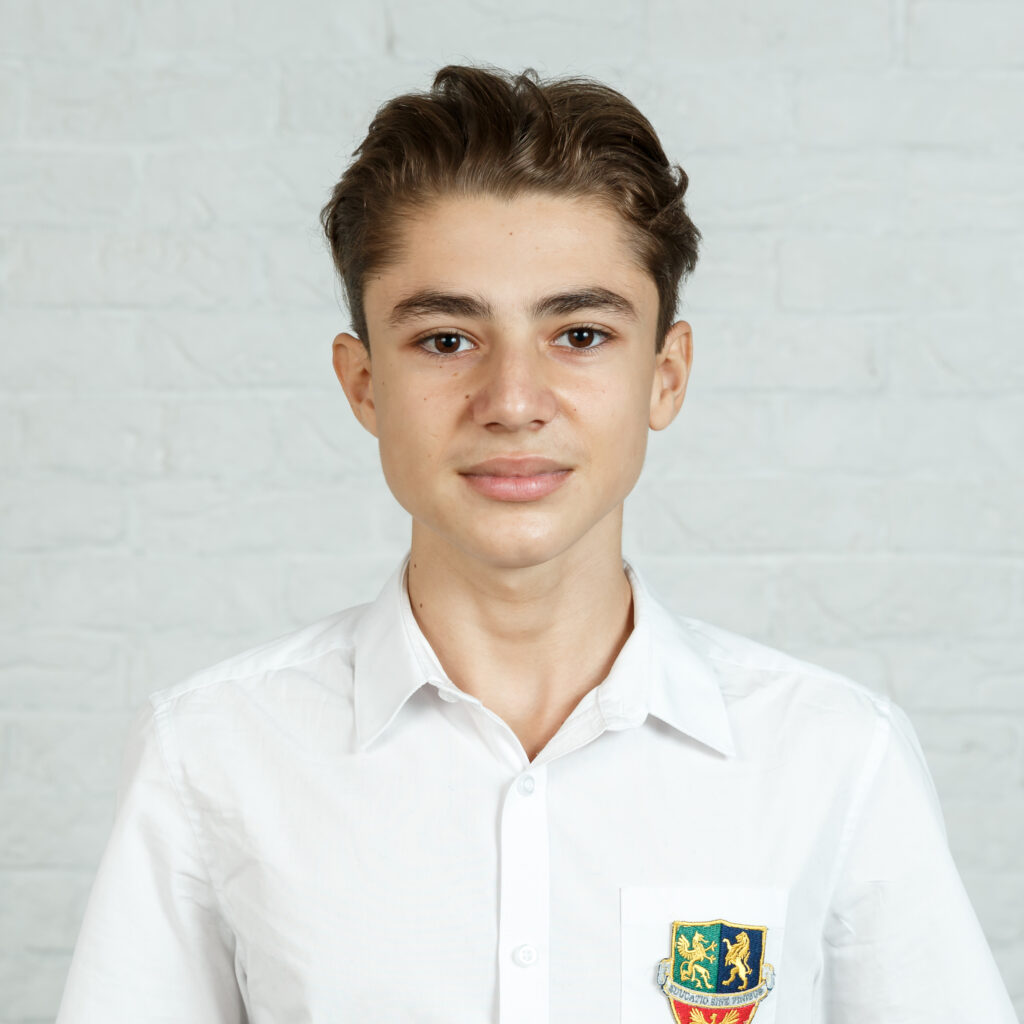
David Kiiovschi
It was an eye-opening presentation with many practical aspects shared, such as the cost of living in London and the day to day experience and conditions there.
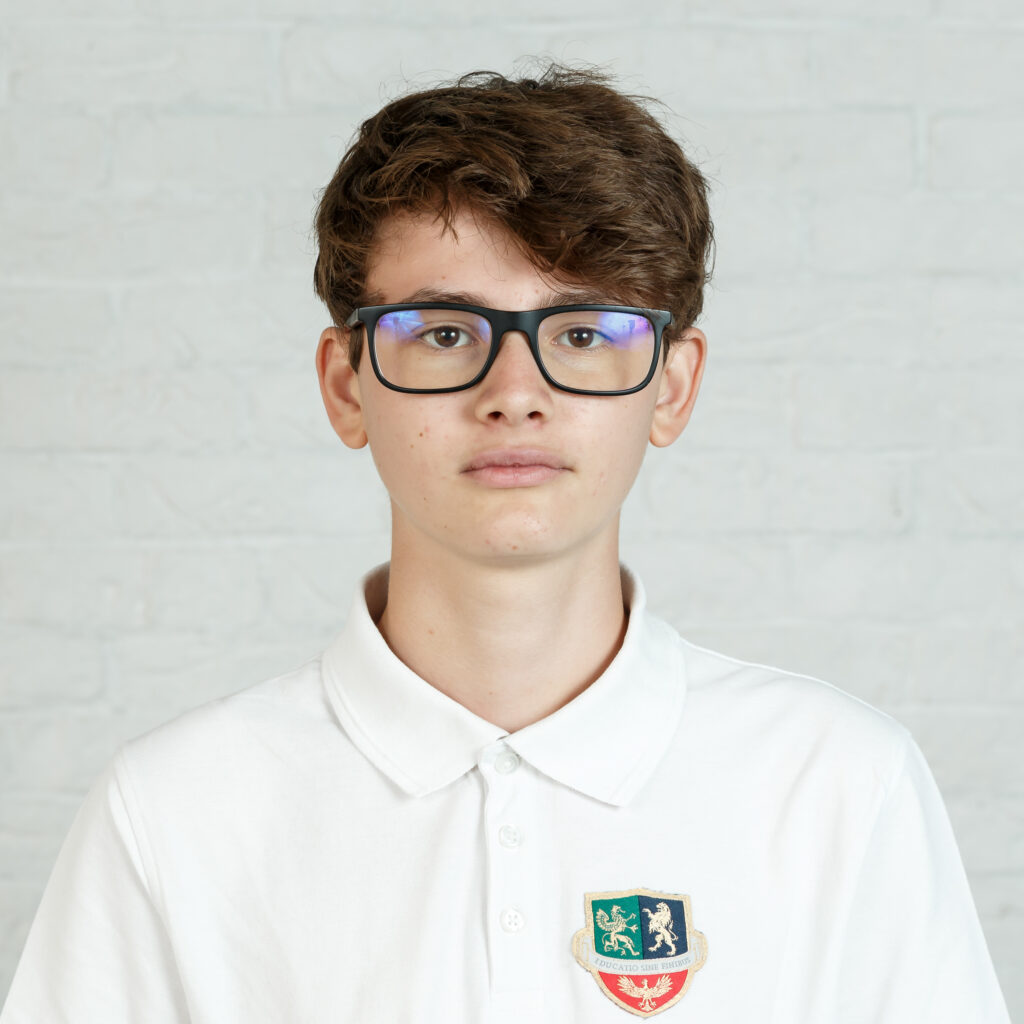
Andrei Stere
This was an enlightening experience with Bogdan offering us greater insight into the academic expectations from universities in London, as well as the social aspects of university life. The talk was particularly useful as he discussed the various issues he faced with accommodation and how to address them. We also discussed transportation and how to tackle budgeting, which was really valuable information.
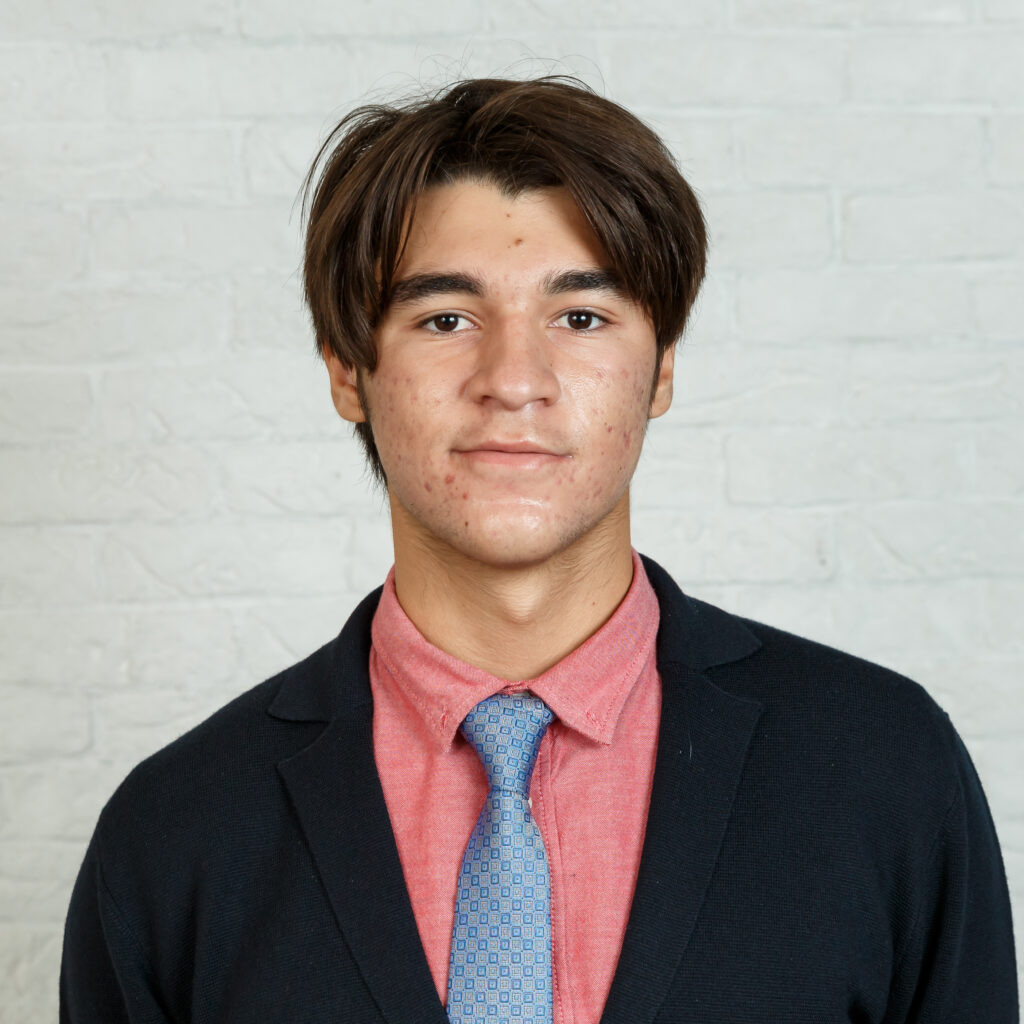
Andrei Voiculescu
Bogdan offered a very informative and fair report of his experience as a student at Imperial College. He presented a number of insights into some of the subjects or courses at university that I and my classmates would like to pursue, which was really helpful and kind. He also kept the presentation concise, including amusing remarks related to the subject, which made the experience not just informative, but also entertaining. Overall, we were able to benefit from his firsthand experience and advice, so I’m really happy that we had the chance to attend his presentation.
Preparing for the new school year at IBSB involves so much more than simply preparing for classes in the many subjects offered, or the extracurricular enrichment programme, with the wide range of clubs on offer in combination with the trips and guest visitors and interschool events. An extremely important aspect of school readiness is providing our staff with the appropriate Health and Safety training, Medic First Aid training, Fire and Earthquake training, and Child Safeguarding training needed to ensure the health and wellbeing of all the students in our care, which includes having a full time nurse and 2 fully qualified child psychologists available on campus to support the students and staff each and every day. At IBSB, you can be absolutely confident that your children are in safest hands!
On Saturday the 5th of March, IBSB opened their doors to warmly welcome in the new prospective families for a fun morning of activities during the Early Years Open Morning.
The morning was specially arranged to offer parents the opportunity to meet the teachers, whilst their children enjoyed a sample of activities that take place during a normal school day, with story time and a variety of fun art and craft activities.
As a part of the morning, parents also had the chance to speak with Head of School, Kendall Peet, during a short presentation and Q&A session, before being taken on a brief tour of the school.
To find out more about the Early Years Curriculum (for 3-4 year olds), click here: https://ibsb.ro/eyfs/early-years-curriculum
To find out more about our next Open Day, or to schedule a visit and school tour, please contact Head of Admissions, Andreea Simon at ad********@**sb.ro
On September 22nd we were delighted to welcome the British Ambassador to Romania, Andrew Noble, onto campus as our special guest of honour to formally cut the ribbon, opening our new Early Years Centre. The culmination of three years development, the new Early Years Centre includes bright open work spaces, specially designed to inspire creativity and encourage collaboration between the nursery and reception aged children, with free flow between the indoor spaces and outdoor areas.
Whilst on a tour of the Early Years Centre, with two of our Year 6 Ambassadors as his guides, the ambassador had the opportunity to meet some of the teachers and younger students, learning from our Head of Primary, who joined the tour a little later on, how our High Performance Learning programme is equipping the children at IBSB with the skills and learning competencies needed to become successful lifelong learners. Ambassador Noble said he enjoyed his visit so much, that he’s already looking forward to his next visit.
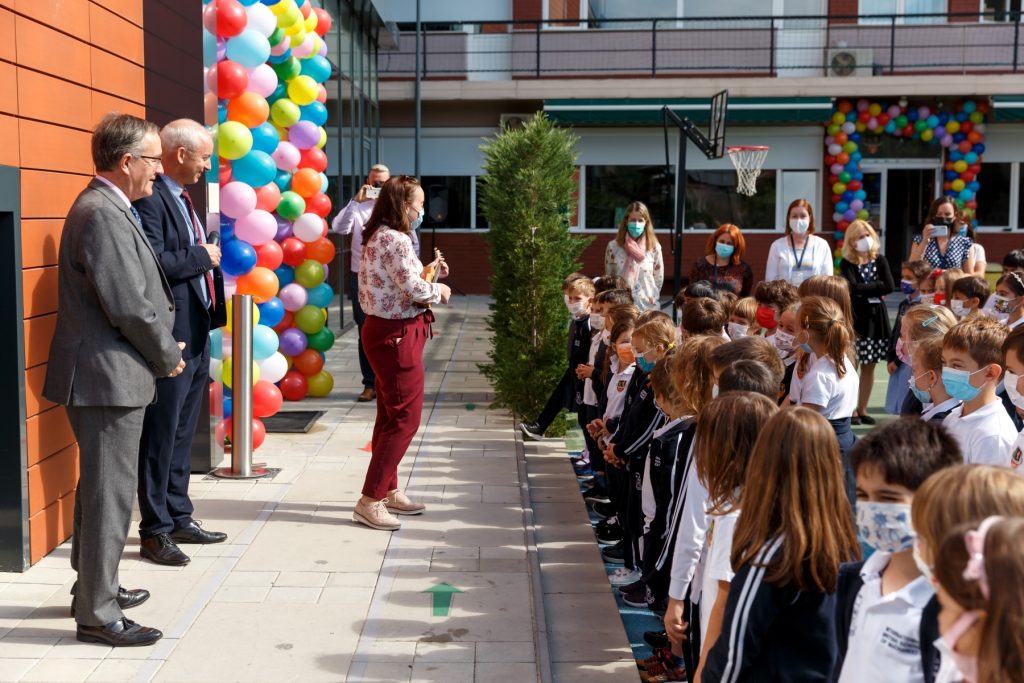
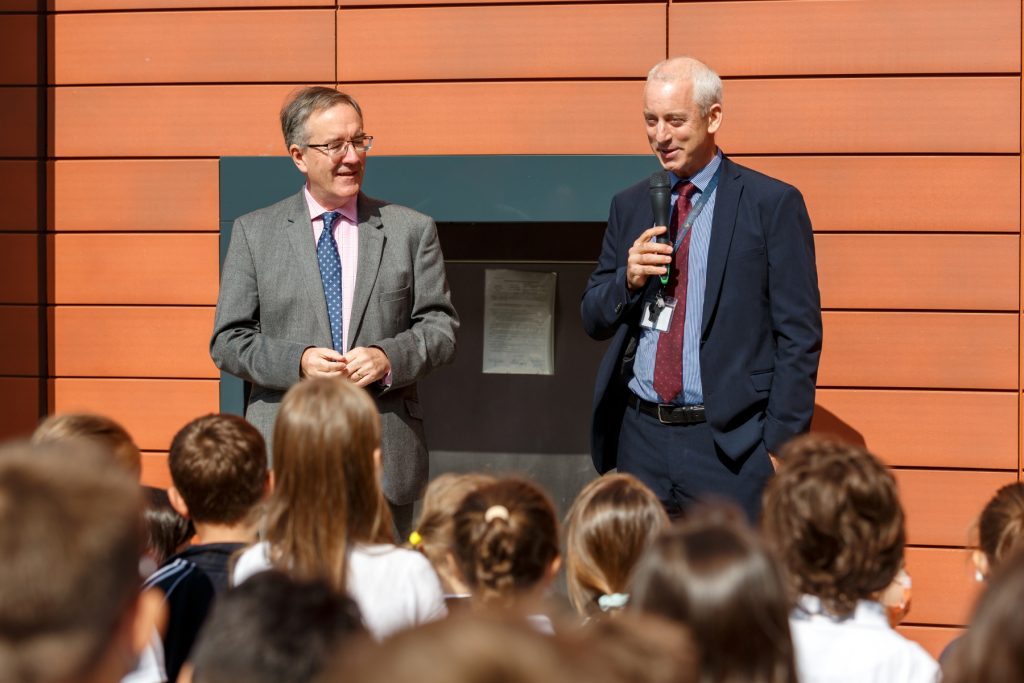
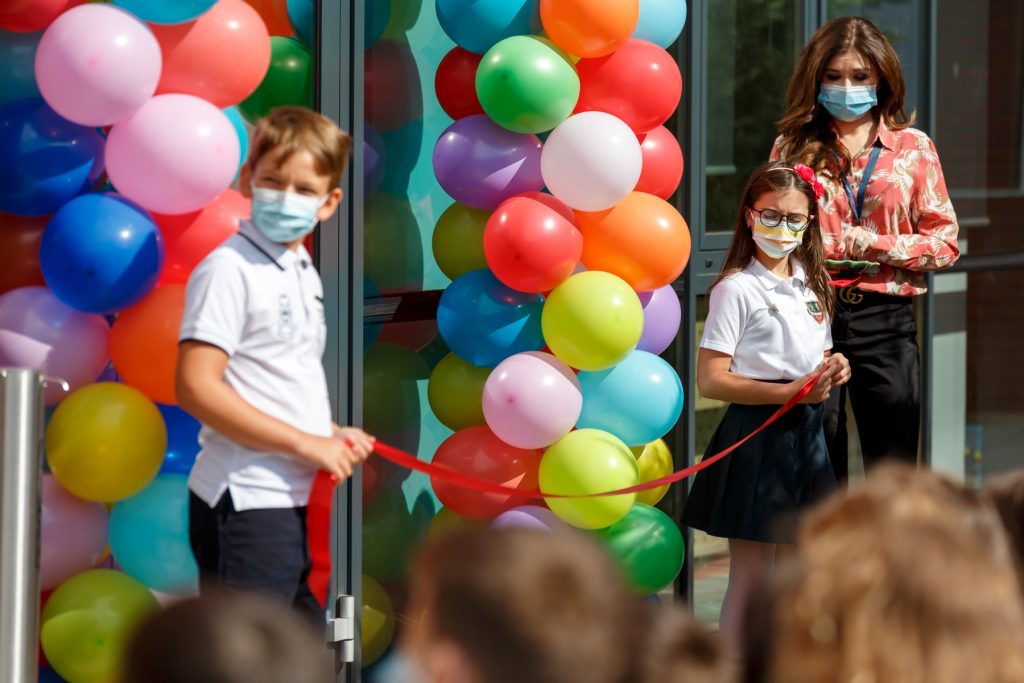
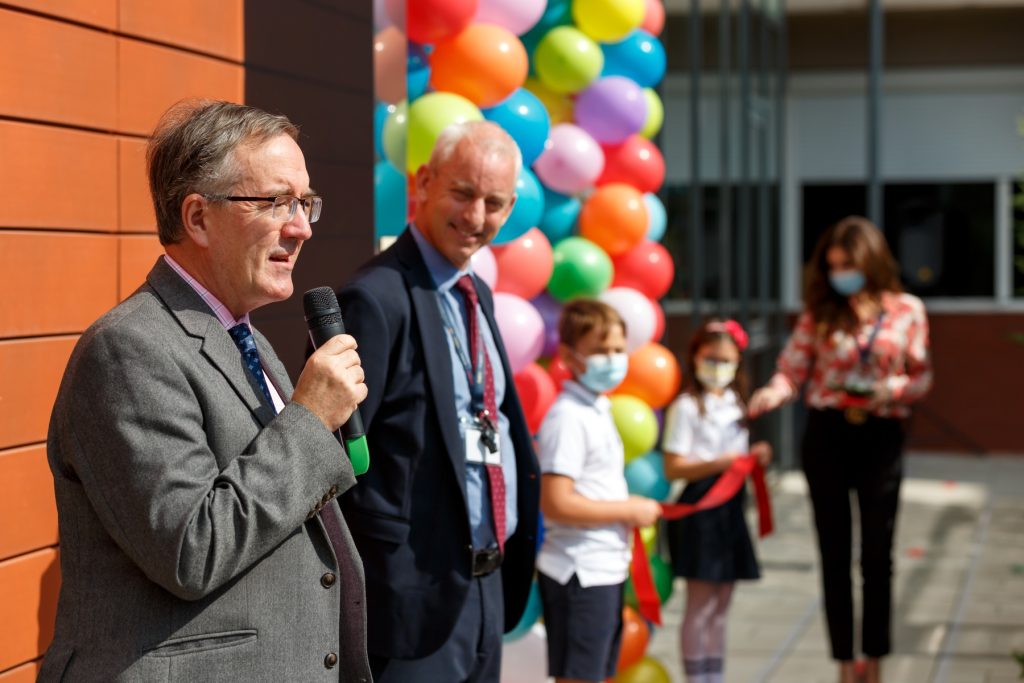
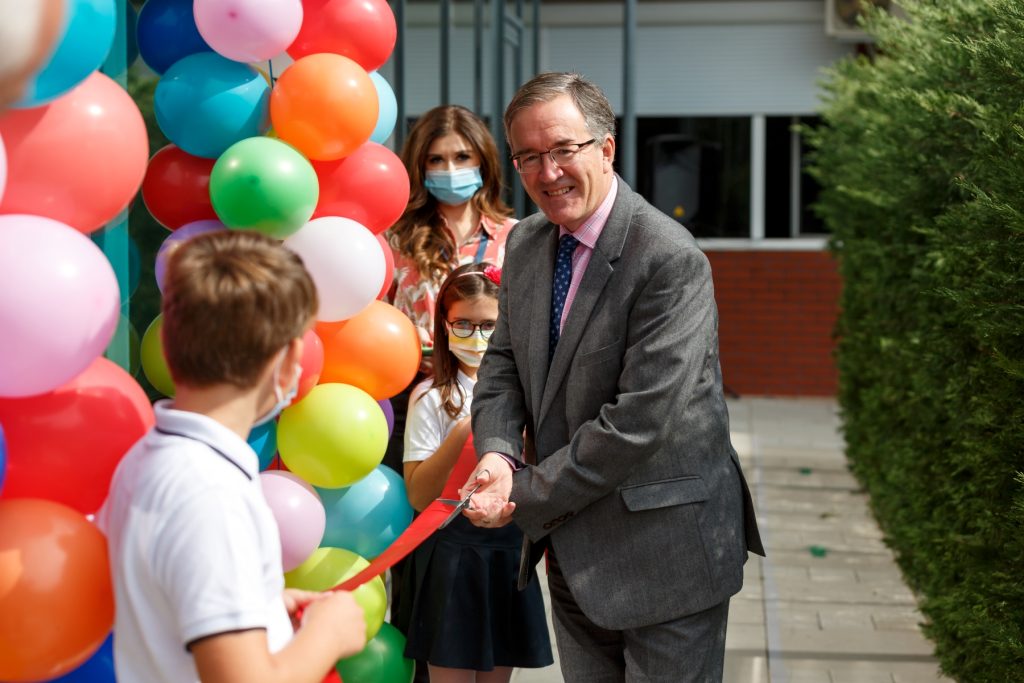
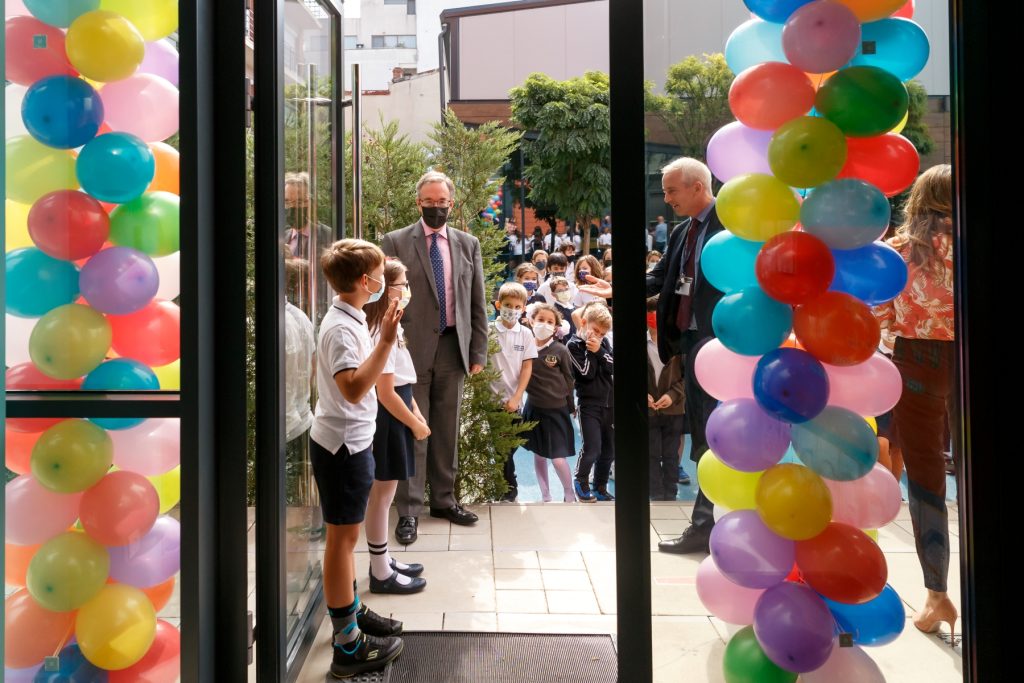
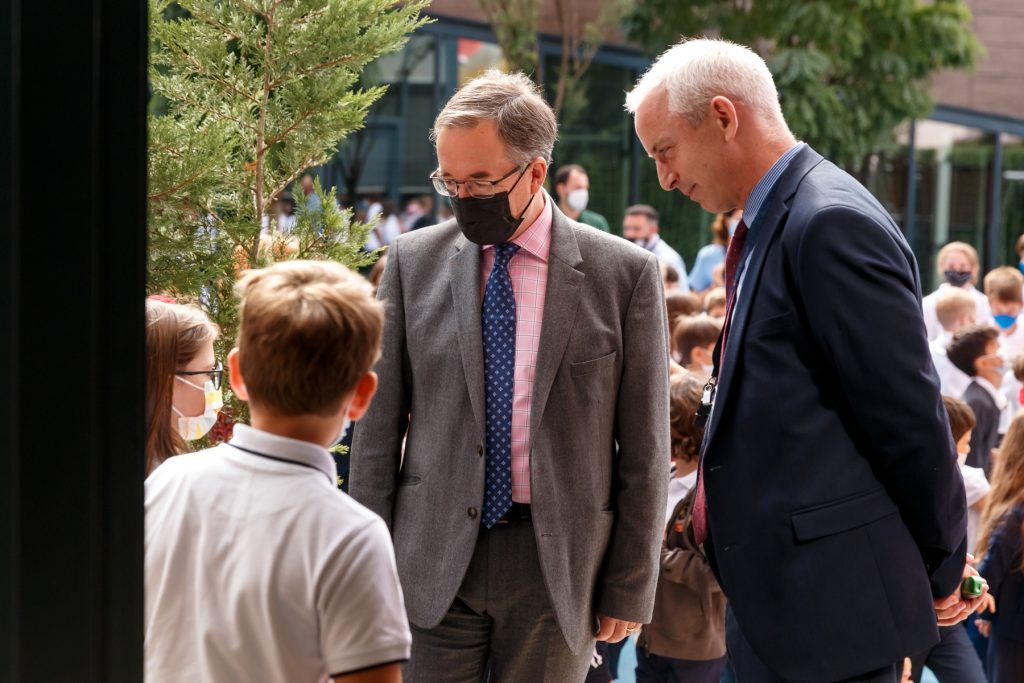
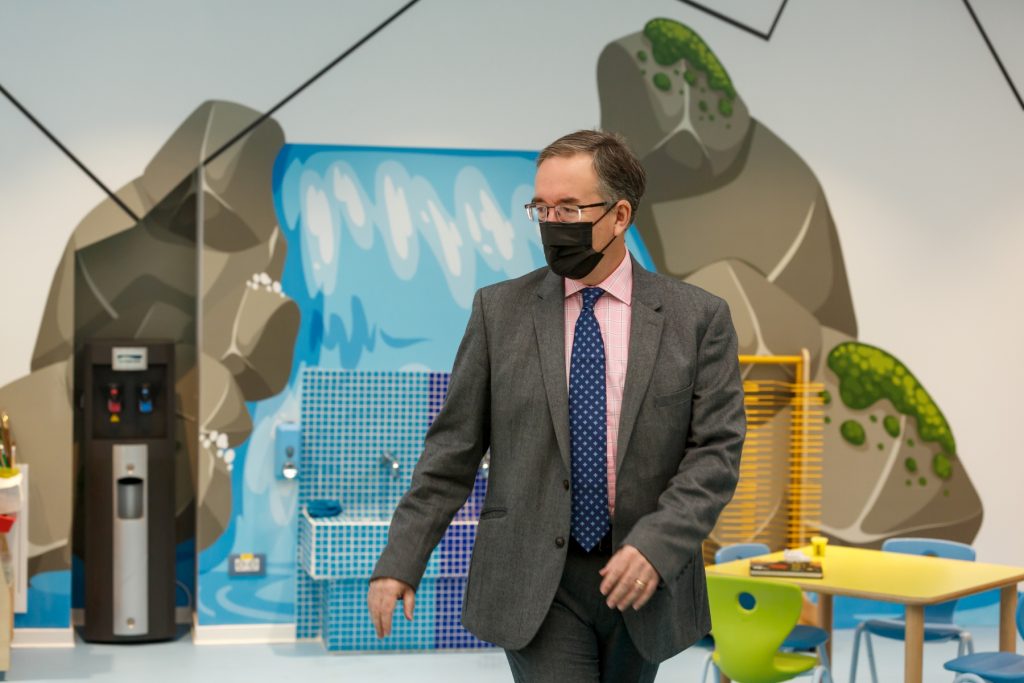
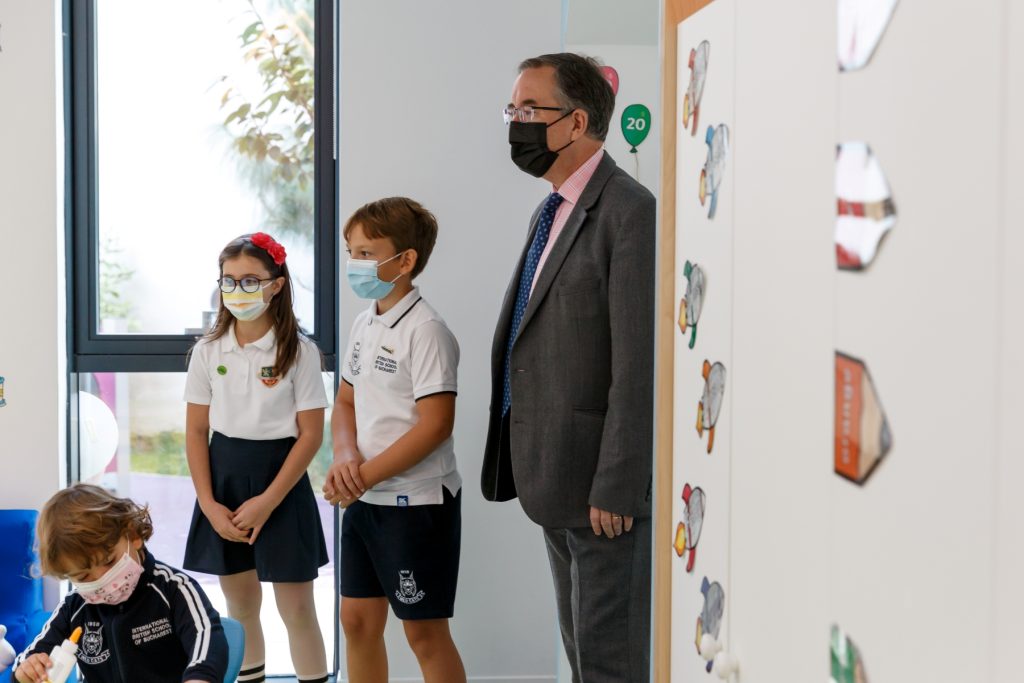
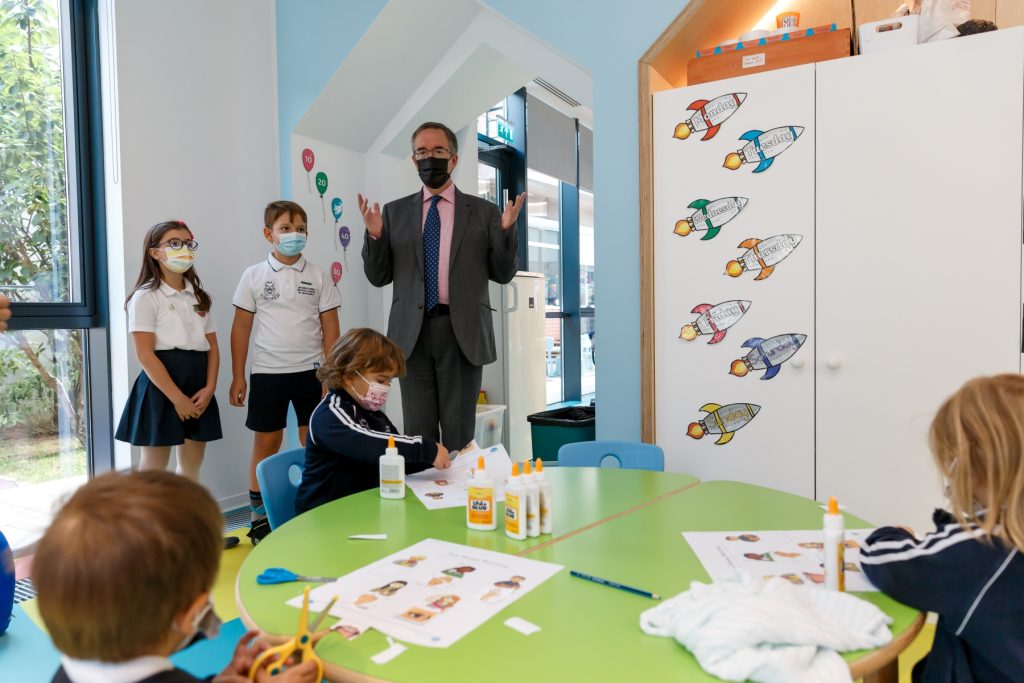
On Wednesday, the 22nd of September, the members of the CAS Club represented the IBSB community in delivering part of the ‘Back to School Collection’ to community partners Casa Agar, Touched Romania’s maternal shelter.
Upon arrival, we were warmly welcomed by the staff and a couple of residents, including Alexandra, who is eleven years old, and was very excited to receive the donations on behalf of the other resident children at school at the time of our visit. She was also very happy to receive Vlad’s illustrated letter (year 2), which read: “Draga invatacelule, iti urez noroc la invatat, sa fii cuminte ca mine si sa iti faci multi prieteni.” (translated: Dear little learner, I wish you good luck with your studies, be just as good as I am, and make lots of friends).
An IBSB student present, helping with the delivery, Qichao (year 10), said he was really impressed by how many people donated to the charities- as sorting the donations into categories took an entire club session. The donation visit itself was quite short, but rewarding, according to Augadh (year 10) who said, “I loved delivering the donation to the children, and I look forward to doing so again in the future.” The rest of the donations were delivered on the same day to Punctul Nordic Corbeanca.
Thank you to the entire IBSB community for all your support and generosity! These small acts of kindness, joined together, make a considerable difference to the lives of those in need of our support. Well done IBSB!
Johanna Croci
CAS Coordinator
With the new school year now underway, the IBSB Pastoral Care System is now is full swing there to help child settle into the new school year, to ensure children feel safe, valued, and grow in confidence and maturity both academically and socially as the school year progresses.
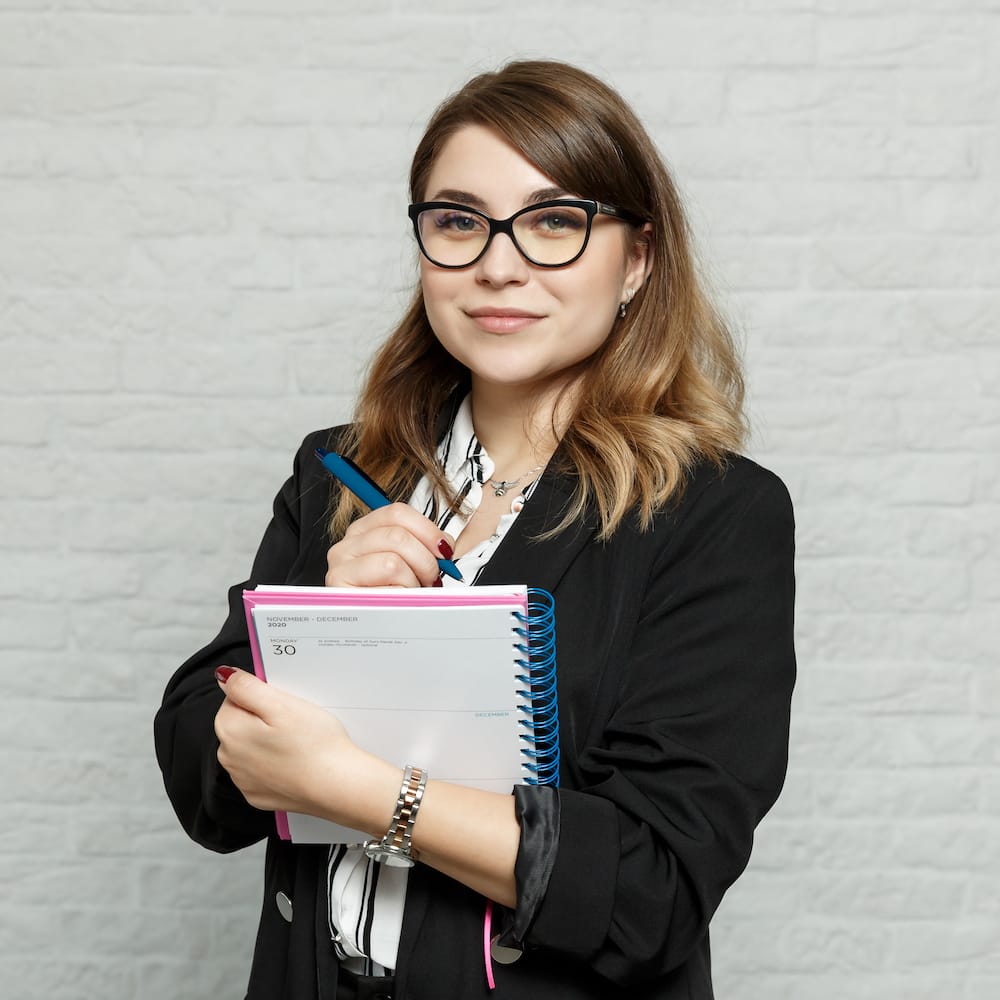
by Ms Cristina Latcu
IBSB Student Counsellor
Being a school with many students, there will of course be instances where bullying behaviour is brought to light and addressed. The way that we approach the issue of bullying is from a multidisciplinary perspective, acting proactively to reduce the level of bullying both within school and outside school, and reactively to resolve issues quickly when they arise.
As a school fully committed to maintaining student wellbeing, we take the time to teach our children from a young age how ‘to behave’ and how ‘not to behave’. We also teach them what bullying is and what bullying isn’t, so that they each know how to identify bullying if they experience it personally or see it happening to someone else. Just to be clear, bullying is not a single incident of one student being unkind to another student, or for example pushing them while in the playground out of anger or frustration. This is certainly inappropriate behaviour, but it is not bullying.
Bullying is the deliberate and intentional behaviour of one student or group of students intended to cause harm and suffering to another over an extended period of time.
Students at IBSB are made aware in no uncertain terms that IBSB maintains a no tolerance approach to bullying, but one that is also educational toward this issue seeking to help those who are doing the bullying to understand why it is wrong, whilst empowering those who may on the receiving end of bullying to know how to best address this issue if it arises.
Thankfully the level of bullying at IBSB is very low, with just minor level incidents happening on a less frequent basis, so we are confident that our pastoral care system is working well.
Having in mind that children spend more time with their peers than with their parents, it is very important for parents to know what signs to look for in order to identify if someone is being bullied. You can find all the signs explained here, along with some other useful information: statpearls.com/ArticleLibrary/viewarticle/35910.
Childhood bullying can have serious effects on a young person’s health: physical, psychological, and social. There can also be serious long term effects, which may include low self-esteem, social anxiety and agoraphobia, decreased performance, suicidal thoughts, night terrors, addiction, and poor interpersonal relationships. You can find an informative article on the possible long-term effects of bullying here: adc.bmj.com/content/archdischild/100/9/879.full.pdf
It is of the utmost importance that we work together as a whole school community to provide a safe environment where our children can enjoy the experience of growing up and maturing into young adults.
If you have any concerns about an issue relating to bullying as the year progresses, please write to your class teacher and the relevant Head of School to inform them of your concerns. You can also arrange a time to speak with a student counsellor to ask for advice, as we are always happy to help.
Have a great year, with many happy memories collected along the way!
In Week 1 of the IBSB Summer School Programme, students in the Young Explorers Class attempted to break the world record for stacking M&Ms as their ‘warmer activity’ before continuing on to read the news article Tallest stack of M&M’s record broken by 23-year-old Brit | Guinness World Records and complete a number of fun activities intended to develop their English skills in reading, writing, listening and speaking. The current IBSB record for M&Ms stacked in a pile is 3. Can you beat that?
Congratulations to our Primary School PE Teacher, Paul Georgescu, for completing his 100km ultramarathon swim at the Lia Manoliu Olympic Pool on June 30, in a time of 34 hours, 42 minutes, and 46 seconds.
Paul was swimming to raise awareness of Autism and support for Centrul Aspera, the first centre in Romania offering a multidisciplinary therapeutic approach for children on the autistic spectrum.
Battling fatigue and sleep deprivation through the later stages of his swim, Paul still managed a beaming smile for the many who turned out to cheer him on as he counted down the final laps, thanking all those who came along to show their support and to those who made a donation.
Paul is a wonderful ambassador of the IBSB Student Mission: Aspire, Strive, Achieve, and a compelling reminder to us all that even the seemingly impossible can be achieved with hard work and unfaltering determination.
If you haven’t yet donated to Paul’s worthy cause, and would like to do so, please click on the following link: https://bit.ly/3w8oeLo
Video of Paul finishing his swim: Facebook

Alan Cornish
Head of Primary School
Wellbeing in schools is now being discussed more than ever around the world and for good reason. There are increasing numbers of articles about the long term effects of this pandemic on our communities and our children’s wellbeing. Anecdotally, we can see this in school too since our return back in February, in small ways. Whilst we are rightfully astonished by the resilience shown by the children, it should not be taken for granted and we are doing all we can to ensure wellbeing is front and centre. And this means accepting that things are not perfect and talking about it.
Children are readjusting to life back in school, to the routines, to their friendship groups, to being outside and wearing masks all day, to the expectations we place on them to achieve and behave. They have to work at rebuilding relationships and trust with teachers and colleagues in an environment that must have protocols to keep them distant. For some, this is harder than others and we accept that. Add to this the pressure many feel to catch up academically returning to school after a disrupted year. Little wonder so many articles are being written, we need help to process this and find a balance.
Wellbeing is essential for learning, and learning benefits wellbeing – it is an interdependent relationship.
A recent Impact Study carried out by Dr Ariel Lindorff at Oxford University, looked at international research over the last 10 years, to better understand links between wellbeing and academic attainment as well as other educational outcomes. The study concluded that there is strong international evidence to support the claim that ‘whole-school approaches’ to promoting wellbeing can influence academic attainment and have positive effects on a wide range of other educational outcomes, including mental health, motivation and behaviour.
As I said, our task is to consider how to marry the two in an authentic, harmonious and sustainable way to ensure our children flourish academically and in their sense of wellbeing. We encourage all to embrace the concept of collective responsibility for wellbeing within our school community, but these are a few of the little things we are doing to try to help:
Firstly, we need to be aware of it, show patience and understanding. For example, we are encouraging those children who are a little rusty on the ideas of fair play and tolerance at break times to reflect on this. If they can, they will be in a much calmer frame of mind to focus in the next lesson and therefore achieve more.
Secondly, every morning, Ms Emilia greets the children as they enter school with a smile and asks a simple question to see how they are feeling that morning. This helps build trust and helps us monitor pupil wellbeing and support where needed. Moreover, before the Easter break, we will survey the children asking them about their sense of wellbeing to help us measure it and further identify areas that we can improve and support.
Thirdly, Year 6’s transition programme has been adapted and brought forward to ensure they are mentally ready for the move to Year 7. This week and next they will enjoy lessons with Secondary teachers and have some counselling sessions to support their mental health and manage expectations.
Importantly, our teachers have identified areas in the curriculum that need more input, focussing on those areas in class and putting in place some intervention programmes for individuals or small groups of pupils who need it more. We also delayed the GL Progression Tests, usually in May, will now take place in June.
These are just some of the things we are doing to support wellbeing and attainment, because we know that happy and motivated pupils behave better and achieve more. This pandemic has made that more challenging for everyone, but, like all things, it will pass. But whilst it is here, noticing the little things matters. For example, have you noticed that wearing masks has reduced your water intake? A little thing that can have big consequences, so allow me to finish with a little tip from Irene in Year 3 to boost your wellbeing and attainment.
Did you know?
Lack of water is the Number 1 cause of being tired during the day – University of Washington studies show that a decrease of 2% water in your body may temporarily lead to memory loss, difficulty in basic maths calculations and difficulty in focusing. If you drink 5 glasses of water you can decrease by 45% the occurrence of serious disease.
As parents, we naturally want the very best for our children. We witness the wonder of watching them grow, learning to crawl, then walk, and eventually talk, and we sense their incredible potential.

The question to be asked and answered is how do we unlock that potential? Unfortunately, there is no definitive guide to good parenting, no universally accepted manual we can refer to unequivocally to navigate our way through the many challenges and choices we face as parents during early childhood and adolescence. We effectively make it up as we go along, doing the best we can with the knowledge we have at the time, hoping in the end that we are making the right choices and that everything will work out okay in the end.
Perhaps one of the biggest mistakes we make as parents is thinking that the most important schooling years are in high school, when our children are preparing for exams that will decide which university they are accepted into.
Whilst choosing a good school, with a proven track record of high exam results and university offers from top universities, is certainly important, secondary school is not where you build capacity. It is during primary school that the brain of a child is most permeable, undergoing hyperbolic growth and development, and it is in the primary school where the foundation for future success is formed.
By the time our children arrive at secondary school, their intellectual capacity will already be self-evident, with some children able to communicate in multiple languages, and with a reading speed two or three times that of other children. It is in the primary school years essentially, that you form the base of your pyramid of knowledge, and the wider and deeper your base, the greater the potential for future growth.
In addition to starting early, Carol Dweck, a lecturer at Columbia University and Harvard University, and author of The New Psychology Of Success, reveals that another key factor of success is not innate talent or intelligence, as many believe, but resilience, being the ability to persevere and grow through adversity.
Dweck provides compelling evidence to show that it is not generally the most talented athletes that make it to the Olympics. Talent itself is not enough. It is individuals prepared to do the work day in, day out, through the pouring rain, the biting cold, and soring temperatures, through injury and short-term disappointments, never giving up on their dream, who eventually go on to achieve success.
Developing a ‘Growth Mindset’ is just one of the corner stones of ‘High Performance Learning’, arguably the most important development in education in the 21st century supporting our growing understanding of nurturing human capability. Another corner stone of High Performance Learning is the key breakthrough in understanding that the brain structure and function is not fixed and unchangeable, which is to say that mental ability has little to do with genes or DNA and a lot to do with the learning environment. This is an important belief in HPL Schools, where all students are considered to possess the potential to be High Performance Learners.
In a High Performance Learning School, students are not placed along the traditional bell curve spread of learners, from low ability to high ability, but rather are placed on a journey moving for the current level of ability for each student toward a high level of ability for all students.

Another important aspect of High Performance Learning, is working closely with parents as partners. Again, in a traditional school, it is normal for parents to drop their children off at the front gate, handing over responsibility for the process of their children learning to the school. In a High Performance Learning School, this is not the case. The parents are given a manual, and ongoing training and support to become ‘High Performance Parents’ working with the school to support their children on their High Performance Learning journey.
“It is essential that parents are involved in the learning process. Without ongoing parental support and involvement, it would not be possible to achieve the results we do,”
Kendall Peet, Head of School at the International British School of Bucharest since 2011
The International British School of Bucharest is currently the only High Performance Learning School in Romania, and with 87% of their students being offered places in the top 5% of universities worldwide this year, it is clear that the school is achieving incredible results.
“We are extremely proud to be the first school in Romania accepted into the global community of High Performance Learning Schools, which will ensure we remain at the forefront of teaching pedagogy, preparing our students with the key competencies to succeed, not just academically, but in life.”
Matthew Tansley, Head of Secondary School at the International British School of Bucharest since 2018
The International British School of Bucharest is the only fully accredited British international school located in the city centre, on a modern, purpose-build campus connecting their students to the world.
To find out more about High Performance Learning, contact the admissions team at ad********@**sb.ro.
This year, two of our students Christie Vernon (Deputy Head Girl) and Max Mihailovici (Head Boy) applied to study at Oxford University, one of the oldest universities in the world and arguably one of the most difficult to gain admission to, being No.1 in the World University Rankings 2021 | Times Higher Education (THE) in 2017, 18, 19, 20 & 21.
The application process itself takes approximately three months, requiring students to complete a UCAS application by October 15, with an expected A-A* average at both IGCSE and A Level, followed by a tough subject specific Oxford University Aptitude Test, and the submission of written work, which the student has worked on independently.
From approximately 23,000 applications, around 10,000 students are selected to attend a series of final interviews on a single day, from which 3,300 students will receive a formal offer.

We are very proud to inform you that both Christie and Max have made it through to the final stage of the application process; an incredible achievement, and even more so considering they are applying two of the most prestigious colleges: Christie is applying to study science at the Magdalen College www.magd.ox.ac.uk, with an impressive list of alumni, including Andrew Lloyd Webber, Oscar Wilde, and 5 Nobel laureates (3 in medicine, which is Christie’s current career choice); Max is applying to study history at Merton www.merton.ox.ac.uk, with an equally illustrious alumni, including Walter Scott, Sir Roger Banister, T.S. Eliot, and J.R. Tolkien, to name just a few.
On behalf of the entire IBSB Community, we would like to congratulate Christie and Max on their tremendous achievement, making it through to the final interview stage. You are both wonderful ambassadors of high performance learning and role models for the generations of IBSB students to come. We wish you the very best for your final interviews in the week ahead.
This year our Head of School once again had the opportunity to join some of the Y13 students in their sixth for garden area for his traditional start of year pep talk.
At the meeting, he gave each student a sheet with the statistical breakdown from the previous exam year, asking each student to circle the subjects they are taking and the grades they hope to achieve.
This informed the students what percentage of the world they need to be in to achieve that grade: you don’t need 80% to get an A in Business Studies, for example, you need to be in the top 13.1% of the world, based on the 2019 exam results.
Click on the link below to see a full review of grades awarded from the June 2019 Exam Session.
Mr Peet then went on to discuss the university applications process and to congratulate the Y13 students on both their work ethic and their results achieved to date, saying that they are very likely to achieve our best exam results ever, with 50% of the students currently on target to achieve an A-A* average in their final year.
Next week, Mr Peet will be speaking to the Year 11 students, having already spoken with the Y12 students last week, to ensure every student has a clear goal in mind- because, as he said to the students, it is much easier to achieve a goal when it is clear in one’s mind from the outset.
Cambridge International IGCSE Results Statistics June 2019
Cambridge International A Level Results Statistics June 2019
Cambridge International AS Level Results Statistics June 2019
This week the staff at IBSB have been busy preparing for the start of the new school year.
An important aspect of this preparation process is ensuring staff receive the necessary ‘Health and Safety’ training, which this year included completing the following six certified courses:
• Online Safety
• Preventing Bullying
• Fire Safety
• Child Protection
• Mental Wellbeing for Children and Young Adults
• GDPR
• Medic First Aid
In addition, to these courses, select staff have also received updated training in safer recruitment, student counselling, and special educational needs support.
When it comes to ensuring student health and safety, there are no staff better trained and prepared to look after your children.
On behalf of the entire IBSB Community, we congratulate our primary school PE teacher, Paul Georgescu, for setting a new Romanian record for the longest swim. Paul started his swim at 03:00am on the morning of August 14, swimming a total distance of 104km along the Danube from Old Moldova to Iron Gates 1, in a time of 21 hours and 40 minutes.
Paul is the first Romanian to swim over 100km, and used the swim as part of his preparations to swim across the Gibraltar Straight, as the 4th leg of his Seven Oceans Challenge, having successfully completed his crossing of the English Channel in 2016, the Catalina Channel in 2018, and the Molokai Channel 2019. Paul is also the current Gold Medalist for the 500m freestyle from the World Ice Swimming Championships in Russia, and holds the world record for the fastest ice mile swum in the Antarctic circle.
In every way Paul is and inspiration to our students and wonderful role model for our entire school community, showing us that anything is possible if you are prepared to work hard to achieve your dreams.
There are an increasing number of private schools in Bucharest saying they offer a ‘British Curriculum’. Many have not been inspected by the Department for Education, and few have qualified, experienced international teachers.
Some even display the COBIS logo on their website. There is, however, an important difference between the COBIS ‘member’ logo for ‘non BSO inspected’ schools and the COBIS ‘Accredited member’ logo for DfE ‘BSO’ inspected schools:
| COBIS ‘Accredited’ Member ‘BSO Inspected school’ | 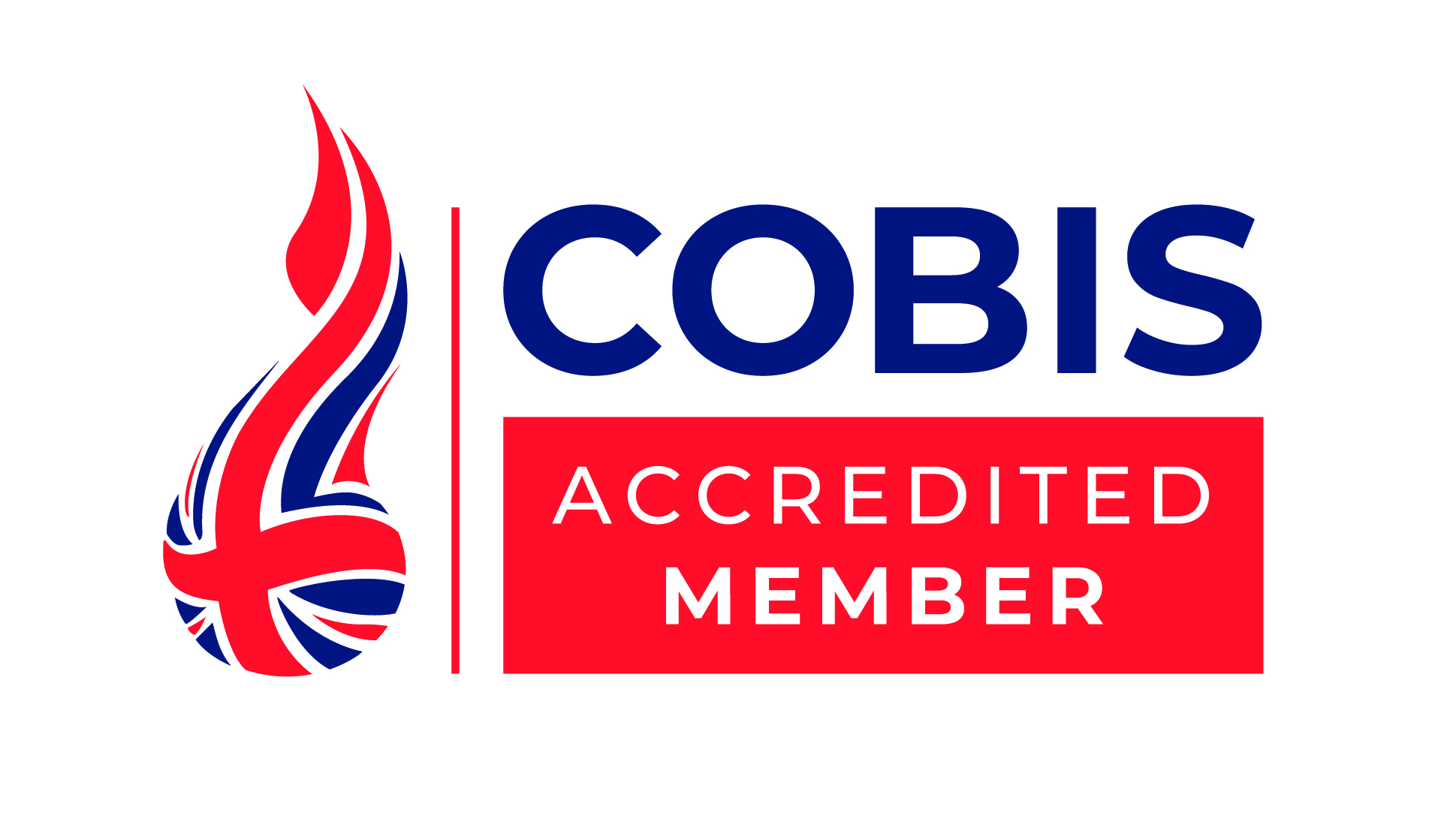 |
| COBIS Member ‘Non BSO inspected schools’ | 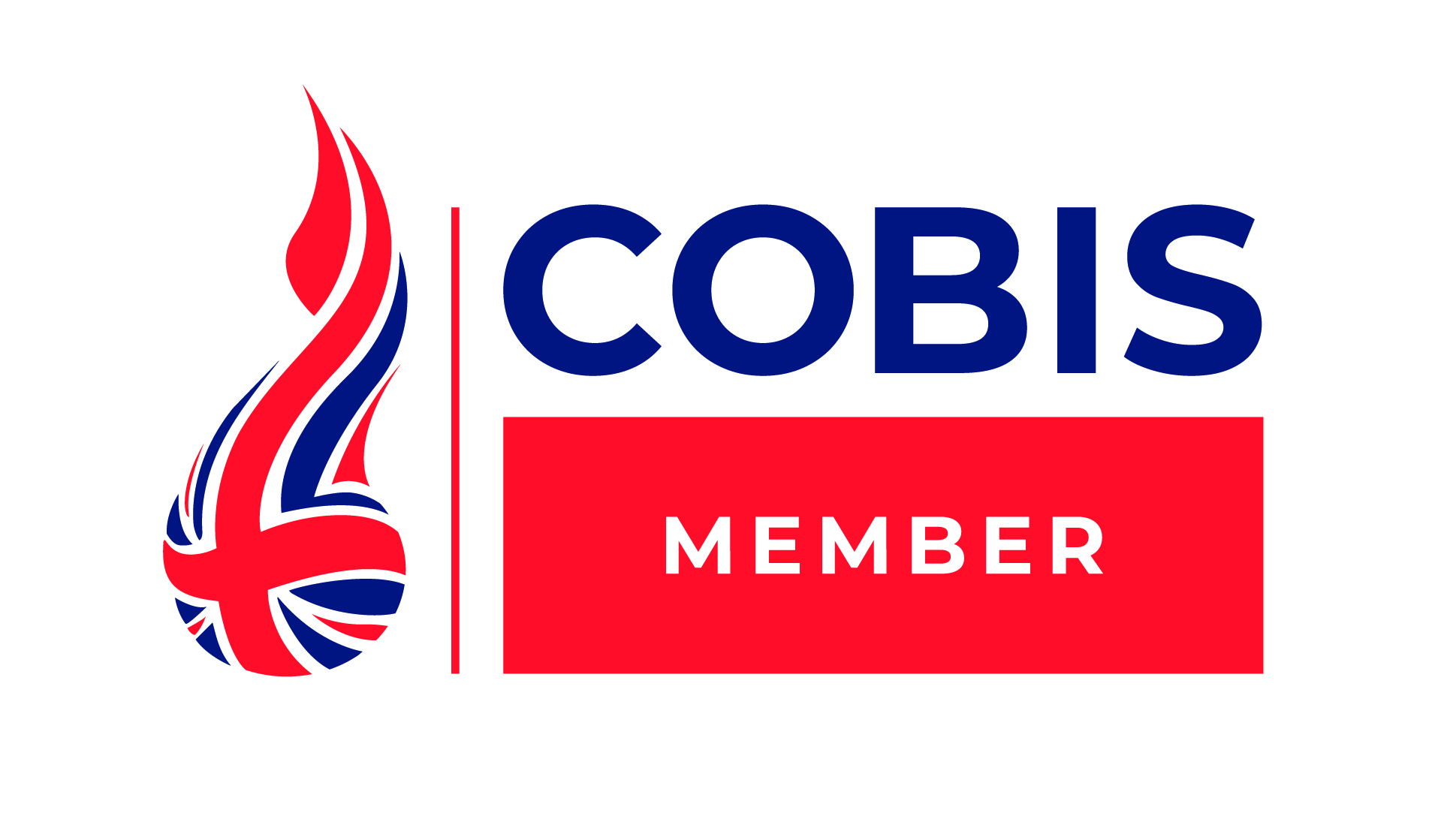 |
AoBSO is THE ONLY association for solely DfE Inspected British Schools.
| AoBSO Accredited School For DfE Accredited British Schools |  |
When looking for a true internationally British Education, look for the AoBSO logo, and be sure to check they have qualified, experienced international teachers, with proven exam results, and a graduate record that shows the school delivers what it promises.
In 2020, 87% of all IBSB graduates were offered places in the top 5% of universities worldwide.
Your children deserve no less. Accept no imposters!
With the highest quality education, everything is possible!
Click here to read more about the IBSB Accreditations.
To find out more about the programmes IBSB have in place to support student success, click on the link below or email ad********@**sb.ro to arrange an appointment with a member of the admissions team.
There are many schools which claim to offer a British Curriculum. Few if any deliver to the high exacting standards set by the International British School of Bucharest (IBSB)- the first UK inspected, COBIS Accredited school in Romania – also the first High Performance Learning school in Eastern Europe.
“Our Early Years Foundation Stage (EYFS) Programme, for children aged 3-5 years, received the highest rating possible in our most recent Quality of Education inspection, showing that we deliver what we promise.”
Alan Cornish, Head of Primary
All our classes have a qualified, experienced native English speaking teacher, with a second teacher present to ensure every student receives the individual support needed to become confident, successful learners.
Student wellbeing and happiness, creativity and physical development are as important as numeracy and literacy in the IBSB Early Years Programme.
Officially opened in January 2020, our new EYFS Centre offers our young learners a warm friendly learning environment full of colour and natural light. Curiosity and creativity are positively encouraged by our modern design concept, which allows students to move freely from the interior learning environment to the outdoors, where their learning journey continues.
It is not surprising therefore, with this much care and thought invested in the learning process, that our students make above average progress: 87% of our graduate students in 2020 were offered places in the top 5% of universities worldwide.
To find out more about our individualised student learning programmes, click the following link or contact ad********@**sb.ro to schedule a meeting with a member of our admissions team.
The WOWSA Award winner is selected by the public in an online poll – one vote is allowed by one computer/one person.
The nominees for the 2019 World Open Water Man of the Year, listed alphabetically, are as follows:
1. Adherbal Treidler de Oliveira (Brazil)
2. Alex Fong Lik-sun (Hong Kong)
3. André Wiersig (Germany)
4. Attila Mányoki (Hungary)
5. Fergil Hesterman (Netherlands)
6. Florian Wellbrock (Germany)
7. Ger Kennedy (Ireland)
8. Masayuki Moriya (Japan)
9. Paul Georgescu (Romania)
10. Petar Stoychev (Bulgaria)
11. Robert McGlashan (Canada)
12. Thomas Pembroke (Australia)
To vote for Paul, please click on the link below (Voting ends Saturday, February 01, 2020):
openwaterswimming.com/2019-wowsa-awards/2019-wowsa-man-of-the-year-nominees/

‘You better watch out, you better not cry
You better not pout, I’m telling you why, cause
(Santa Claus is coming, is coming to town)’
This year’s carol service began with Head of School, Mr Peet, welcoming all present and thanking Ms Evi and the students for all their hard work preparing the carols and the readings, and Father Terry for once again allowing the IBSB community to hold its annual service at the Biserica Anglicana. He then reminded everyone present that Christmas, above all else, is a time of giving: to give thanks for all that we have, and to give to those in need, going on to thank everyone for supporting the various IBSB student-led charity initiatives. He also encouraged everyone present to commit to a New Year’s resolution that would contribute to solving global warming, by buying eco-friendly products, recycling, individually reducing our use of fossil fuels, or eating less meat, saying that it is up to each and every one of us to ensure a greener, cleaner world for future generations.
With the formalities out of the way, it was on to the carols and readings. The student readers for this year included Carla Dumitru (Y6), Ana Wang (Y6), Priya Vijaykumar (Y6), Melissa Aydogan (Y11), Irina Chemencedji (Y12), Alex Serban (Y12), and Max Mihailovici (Y12).
The carols selected by Ms Evi, and performed by the IBSB Student Choir, included ‘Salve Regina’, ‘Joy to the World’, ‘Adeste Fideles’, ‘Ode to Joy’, ‘Carol of the Bells’, ‘Hallelujah’, and ‘Deck the Halls’.
What better way to bring the first term to an official end, than for the IBSB community to come together to give thanks, to celebrate, to look to the future with a sense of hope and promise, and to sing Christmas carols, wishing peace and goodwill to all mankind.
Wishing everyone a very ‘Merry Christmas’ and a ‘Happy New Year!’
It’s much easier to study if you have answered the big question WHY?
Universities fairs are one proven way to answer this question, bringing added meaning to what students do each and every day in the classroom.
Developing a clear understanding of the university application process and the prerequisites for each university and the courses they offer helps connect the work our students do now, as they prepare for their IGCSE and A Level exams, to their future dreams and aspirations.
As our students work around the hall of exhibitors from table to table, speaking with the admissions officers, asking questions and collecting brochures, they begin to understand what is needed to turn their dreams into reality, and in doing so return to their classrooms more motivated to learn, prepared to do the work needed to make their dreams a reality.
We would like to thank the British Council and the many universities that took part in the university fair today at IBSB for being an important partner in the education of our students.
The incredible success of IBSB Student Graduate Programme is a direct result of the IBSB Community and the strength of our community partnerships.

Following on from the students observing 1 minute of silence at 11.11 on Friday morning, Head Girl Luiza R. and Deputy Head Girl Lisa P. joined our Head of School, Mr Peet, along with many ambassadors and dignitaries, at the Commonwealth Graves Cemetery at Tancabesti on Sunday, November 11, for the 100th Anniversary of the Armistice Ceremony to lay a wreath on behalf of the IBSB community in remembrance of those who lost their lives in times of war. It was a touching service, with the children present given carnations at the end to lay on the graves of those buried, before departing for an official lunch with the British Ambassador.
Monday October 29 was an exciting day for all the staff at IBSB, who came together to review the latest approaches to blended learning, as IBSB moves toward becoming a Google Education School, using Google Classroom as a tool to support student learning. The main objective of the day was to provide staff with time and support needed to set up their new Google Classrooms, which will be rolled out to our students in the weeks ahead. More to come!
In an effort to strengthen relationships between International schools in Bucharest, the Deutsche Schule Bukarest (the German School of Bucharest) put together a small meeting Wednesday morning. It featured students discussing ways in which we could cooperate – for example art competitions, balls or student exchanges. I’m really happy with what we accomplished and excited to see what the future holds.
Christie Vernon – Student Council President
Recently our Y5 & 6 students studying German had the opportunity to visit “Hermann Oberth School” as one of the activities organised to celebrate German National Day. During our visit the students spoke to the children in German, sang the German National Anthem with the other children, had fun learning a traditional German dance, and even got to eat some German donuts. The students also got to paint a traditional German (Sasesc) print, following either a traditional pattern or their own design on little wooden plates. Everyone had a great time and made some new friends, so we are all looking forward to our next trip!
On Tuesday morning we hosted a visit from the University of Essex. All Year 12 & 13 students were off timetable for one lesson to take part in the presentation. Andrew Marriot was asked to concentrate on the areas of interest of our students at the moment; primarily writing personal statements, the application process to the UK and student finance available. All of these areas were covered in depth, along with some information on the University itself. Our students had the opportunity to ask questions and look at examples of good and not so good applications that the university has received. I know that our students thoroughly enjoyed their hour and left much more informed.
The RIUF university fair is next weekend (6th & 7th October) which has been extensively advertised to our students. It is highly recommended for parents and students in Years 11 to 13 to attend. Maybe I will see you there.
On Thursday 20th September the IBSB English Department entered ‘JAWS’: not a death-defying encounter with a great white but actually a new educational initiative: ‘JAWS’ stands for ‘Job Alike Workshop’ and the idea is to get departments together from across the International schools in Bucharest and to share ideas, questions and solutions. This we did. it was a very successful afternoon and all the schools involved benefited from the shared experience. Some new ideas also formulated and we have all returned to our respective schools ready to try new things; all in pursuit of delivering even better English classes. Other departments will be rolling out similar workshops over the coming months, IBSB will soon be hosting the Maths department meeting.
Friday, June 15, was a memorable day as the Year 6 students stepped forth one by one with confidence and beaming smiles to receive their official graduation diplomas at the Primary School Graduation Ceremony. In an emotional ceremony, which included Head of School, Mr Peet, offering the students a few words of advice from Dr Seuss, and Head of Primary, Mr Alan Cornish, reflecting on how fast the time had passed, it was the students who took centre stage as they thanked their teachers and parents for all their support over the years.
The ceremony also included the presentation of the prefects awards, house captain awards, and the awards for academic and sporting and excellence, and community support.
On behalf of the entire IBSB community, we offer our congratulations to both the award winners and the graduates of 2018!
We hope you all enjoy your summer break and look forward to welcoming you into the Secondary School next year to begin a new journey and a new adventure.
If you were looking for an answer to what makes an international school such a good educational choice for your children, then you need look no further than ‘Citizenship Day’.
The theme for the Secondary School Citizenship Day in Term 1a was ‘European Day of Languages’ combined with ‘International World Sight Day’. Wearing House Colours, the students worked together in their Houses to solve puzzles and answer quizzes in German, French and Spanish, learned tongue twisters in Turkish, Chinese, and Korean, made Japanese origami models, and wrote messages in braille, to name just a few of the activities organised, collecting valuable house points along the way. There was lots of laughter but also importantly collaborative learning with plenty of opportunity for the students to develop their leadership skills, communication skills, and teamwork skills – important skills for the next generation of graduates.
Since mid-February the Year 9 students have been having “Humanities lessons with a difference.” To enhance their research, team work and presentation skills, the students received instruction and help from Mr. Storey (Geography), Ms. Baker (Business Studies) and Mr. Gowen (History). The overarching idea was that each group needed to create a tour or holiday to attract foreign tourists to Romania. The students could choose the type of tour or holiday, conduct market research and create the presentation in whatever format they desired; ready to be showcased to an independent judging panel, fellow students, parents and teachers on Friday the 5th of May.
To assist with the project, the students were taken on a trip to Sinaia where they were able to complete an activities workbook based on Sinaia as a tourist destination. They visited various tourists sites and had the opportunity to visit the Tourist Office to obtain resources for their presentations. Luckily the weather was lovely and we had a fun trip.
The Romanian Tourism Market Place event took place on Friday. The students were a hive of activity getting all of their resources ready to present. The judges arrived at 10am and circulated the teams. Various parents, students and teachers came to view the event. The 8 teams did an amazing job and showed a level of maturity that many people commented on. The winning team “Unravel Romania” were awarded with some cinema tickets and will be accompanying me to the Bucharest Tourism Conference this Friday at The Radisson Blu Hotel. All teams were commended for their outstanding performance by the judging panel, who commented on how difficult the judging was.
Since the event, the students have reflected on the whole project. The comments have been very inspiring to read. The overwhelming thoughts of the students were that they enjoyed this style of learning, overcame shyness, enhanced their team working and presentation skills and learned more about Romania and the tourism industry as a whole. It was a pleasure to watch the students blossom through this activity and I look forward to running more successful projects like this again in the future.
The Middle School MUN club attended their very first Model United Nations Conference this weekend. We had a wonderful time, and the students found that their background research, draft resolutions, and position papers served as good ammunition in their negotiations within their respective committees. Being a middle school conference, the complexity was reduced, and this helped our first time MUNers ease their way into the proceedings of such a conference. Many of our students are now eager to participate in more complex high school MUNs next year. The event was non-competitive, allowing each student to develop and practice skills at their own pace. The highlight was the alien “invasion” that was debated in the General Assembly. The students threw themselves into the hypothetical positions of their countries, and had a great time doing so as you can see from the photos.
Blessy Savu
KS3 MUN Coordinator
The Year 9 CAS Club members, Irina C., Jamie B., Haesung O., and Maria L. sold hot chocolate and hosted a comfy clothing non-uniform day to raise money for the abandoned babies and single mothers cared for by ‘Touched Romania’. This was entirely a student initiative organised by the students independently! It was Irina and Jamie’s idea and they called on their peers for help and donations. Ioana A. in Year 7 also made a very generous donation. Well done to all the students involved – you are an example to us all with your fantastic Community Spirit.
This term Year 5E have been looking at how World War 2 affected the lives of millions of people. In our English lessons, we have written a news report about Pearl Harbour, read a novel called Return to the Secret Garden (about the adventures of some evacuees), and are currently dong some work about Anne Frank’s diary. We have also learnt a lot about propaganda posters, the Blitz, communications, evacuation, and the precautions taken by people during the war, such as rationing, air raid shelters, and gas masks. We have enjoyed a great variety of activities including using torches to signal in Morse Code, handling a gas mask (kindly lent to us by Mrs Alina Pascale), and on the 9th of December we went to London Street Atelier to cook a meal using wartime ingredients. While we were there, our instructors were very impressed with the children’s level of knowledge, as they were able to answer all of the questions during the introduction! It has been an interesting and enjoyable topic for us, and one which has provided many learning experiences.
On Friday, October 7th, IBSB celebrated World Sight Day. The children arrived in school wearing sunglasses of various shapes and colours to mark this significant day. During the afternoon, each class got a visit from Brambles the guide dog and his handler Steve. Mrs Camelia Platt from Light Into Europe told the children that there are 100,000 children and adults in Romania with eye problems. The children brought a 10 lei donation for Light Into Europe and were told that it will be used to train the guide dog and provide canes. The message each child has promised to take home and tell their parents is that a visually impaired person has the right to go anywhere with a guide dog.
Our primary school began Peace One Day by drawing and writing what peace means to each child. This activity generated lots of ideas as to how we as a school could celebrate this day. Therefore, we decided what better way to mark this special day than to make the peace symbol in our houses! During the afternoon break, each child in their colours of red, yellow, blue made their way to the playground to join in with the making of this symbol. It truly was a coloured spectacle in the name of peace! Every child joined hands to unite in an effort to create the largest reduction of violence globally, as well as the largest gathering of children in the name of peace, on one day – Peace Day. It is our participation as a school and other schools around the world on Peace Day that will ensure the success of this historic event and contribute to the institutionalisation of Peace Day around the world.
Year 6P had an extraordinary start to the new academic year 2016-2017. The old students had the pleasure to meet four new students and make them feel welcome and happy. They talked a lot as well about their wonderful summer holiday and then, the Year 6P students were asked to write about their summer memories in their English books. Also, in Art all the children really enjoyed the lesson, because they had the opportunity to play with and mix the various autumn colours. At the end of the lesson they created extremely nice autumn paintings. Here is some of their beautiful Art work:
Last week, during Maths time, Year 6P learned about quadrilaterals and 3D-shapes. First of all, the students remembered the notions that they learned in previous years. Ms Punt explained that there are many types of three-dimensional shapes. The children talked about spheres, cubes, prisms, pyramids, and other three-dimensional shapes whose faces are polygons. They solved many exercises involving 3D shapes. Then they were given some printed 3D shapes with basic, artistic, and fun designs to cut and paste. By folding 3D paper models, colouring and creating different patterns, sequences on their shapes, Year 6P has come up with a wonderful geometrical collection. It has been a very interesting and relaxing lesson learning the 3D shapes. Here are some photos with our beautiful Math crafts.
The Summer Show is always one of the most eagerly awaited events on the school calendar, not just because it is the final day of the year and summer holidays are just around the corner, but also because it is a celebration of the year’s endeavours. The students put on a great show, the award winners are announced, and we get to find out who won the House Cup – congratulations to Dobrogea by the way!
Thanks once again to all the parents who supported us at our final event of the year, as you have supported us throughout the year.
The PTF Social Calendar continued to offer our students, parents and staff a variety of opportunities to get together and socialise outside of school. Shifting from the increasingly popular Sunday Brunches, to the Summer Pool Parties, with a pool party organised first at the Daimon Club, on Sunday, May 27, and then at the Ramada Plaza Vitality Wellness Club, on Sunday, June 25. On both occasions all present were lucky to be able to enjoy warm weather with blue skies overhead. A big thank you to PTF President, Ms Claudia Marta, for arranging these social events, and to both Daimon Club and the Ramada Plaza for hosting us. I think the photos show that everyone present had a nice day in the sun.
The Year 6 ‘Moving On Ceremony’, which took place on the final Friday morning of the school year, being, Friday, June 24, was an emotional affair with the pupils from Year 6 each saying a few words before joining together for a rousing song, with piano and guitar accompaniment. They finished, as tradition dictates, flinging their mortar boards high into the air. They then did it again, because it is fun, and because some of the parents missed the Kodak moment. All in all, it was a wonderful moment in time shared by all present; a family occasion, with memories collected to last a life time.
Looking at the Year 6 graduates of 2016, we marvel at how far they have come during their time with us and rejoice in their bright plans for the future. It has been our pleasure to watch them grow with the school, celebrating both their endeavours and achievements, as they have filled me with a sense of pride, along with their parents.
The Senior Graduation was once again an emotional affair with a mix of laughter, tears, excitement, and just a touch of sadness as Mr Lee for the last time read out the names of the graduating students who one by one ascended the stage, taking their turn at the lectern to say few words about their experience at IBSB and to thank those people who helped them along the way, before receiving this graduation diplomas. Photos were taken, caps tossed, and the graduates of 2016 moved out into the night, onto their graduation dinner (this year on Level 21 of the Intercontinental Hotel) and a night of celebration that no doubt for many went on to the early hours of morning.
On behalf of the entire IBSB Community, a heartfelt congratulations to the graduates of 2016! We look forward to tracking your progress as you join our ever expanding Alumni Community.
May you each achieve success in life and your dreams become your reality!
Well done to the IBSB Middle School Debaters for winning the 2016 Junior Sir Winston Churchill International Middle School Public Debating Champion. The IBSB team went through the entire competition undefeated , winning both of the prepared debates and their impromptu debate.
It looks like the future of debating at IBSB is secure with the younger debaters showing they have as much to offer as the senior team who have made the final of the senior competition three years in a row, winning it twice.
A big thank you to Ms Blessy Savu and Mr Afzal Shaikh for all their work preparing the team over the last year.
Enjoy the celebrations everyone!
Middle School Team: Christie Vernon, Luiza Ruptureanu, Tamara Minea, Maximilian Mihailovici.
THE IBSB Annual Sports Day took place on friday at Lia Manoliu Stadium. In the end we were very lucky with the weather as the early morning light rain stopped just before 9am, so no one got wet. We all enjoyed a nice day of sports with some sun and enough cloud to keep us all from being too hot or getting sun burnt. A big thank you to the staff and parents for their support on the day, to this year’s sponsors Borsec who provided the Sports Day Shirts and Water, Sunwave Pharma who once again sponsored the Sports Day Caps, Danone, who sponsored 4 full fridges of yoghurt, Mega Image, who provided the fruit for the children, and Tchibo for their great Coffee, which the parents and teachers definitely appreciated. Thank you also to World Ultramarathon Champion, Andrei Rosu for presenting the trophies this year! This year’s champions were the Dobrogean Team! Great Job Dobrogea!
We congratulate Maria (Year 13), who is the third IBSB student to obtain her Silver Duke of Edinburgh Award!
The Award was presented in an official Ceremony in Brasov. 56 young people taking part in the programme, from Brasov, Fagaras, Cluj, Bacau and Bucharest were rewarded for their exceptional progress and for completing the four sections of the Award: Service, Skills, Physical Recreation and the Adventurous Journey.
As part of her Service, Maria supported the academic and emotional needs of a gifted 12 year-old boy. Maria helped the boy develop his self-esteem and motivation, while training her listening skills. She did this activity under the supervision of our Educational Psychologist, Ms Aida Ivan.
For her Skills section of the Award, Maria chose to learn how to cook. A very useful skill, especially as she is preparing to leave to university this summer. She has gradually advanced from preparing simple, fresh meals to more complex and demanding recipes. She is now able to cook a range of healthy dishes.
For her Physical recreation Maria continued improving her tennis practice.
Embarking on one of the most demanding and ambitious adventurous journeys, Maria hiked the peak route of the Piatra Craiului Mountains, from Vf. Ascutit to Piscul Baciului and came to Bucharest as a winner!
Maria has also completed her sections for the Gold Award, and she is eagerly awaiting the official ceremony that will recognise her achievements this autumn.
We are proud to have had Maria as our student, as she is a model of initiative, drive, and involvement. A worthy example to follow for all our pupils, and not only!
Last Saturday, the 14th of May 2016, the participants to the Duke of Edinburgh International Award had the opportunity to attend “Impreuna spre Inaltimi”, a series of training workshops at Decathlon Iuliu Maniu. The event was organized by the CADDRU Association in partnership with Decathlon Romania.
The workshops covered five areas of the theoretical training for the Adventurous Journey Section of the Award: First Aid (covered by the Romanian Red Cross specialists), Tent Pitching, Navigation: map and compass, Equipment (including how to pack) and Survival Techniques. With over 60 participants of the Duke of Edinburgh programme attending from various centres in Bucharest, the event was a real success!
Three participants from IBSB joined: Tudor M., Luca O. and Eva S. (Year 10). Eva won one of the prizes kindly offered by Decathlon. We wish all the Duke of Edinburgh participants good luck with their expeditions this summer and hope that they will have exciting stories to tell on their return!
As part of the Olympic Games Topic we are currently covering in Year 4, the children had to create an Olympic Torch for a future Olympic Games in Romania. Once again the children exceeded expectations with their torches. Their creativity was clear in their projects and we had an excellent “Torches Parade”; the children went to Mr Tiplea’s office and had to answer questions from Mr Hewett and Mr Tiplea. To make the whole event even more interesting, one of the students in Year 4 brought in an official Torch from the Athen’s Games in 2004! Overall, a great experience for all!
This week, on Monday, during Cross Curricular time, Year 6 continued to work even more on the theme of this term – The Olympic Games. First of all, the students needed to take into consideration some important things for this lesson: scale drawing, design, and awareness of space. Mr Ennion explained at the very beginning how to find out a scale on the map and how this was going to be used: the children learned how to read a scale by measuring given distances on Google Maps and using strips of paper. Excitedly they spotted IBSB on Agricultori Street on Google Maps and started to measure the length of the school. Then they tried to find out the distance from our school to the National Stadium. After that, all the students were asked to create their own map of ancient Olympic Games and to draw different types of buildings, such as a Hippodrome, Gymnasium, Palaistra, Stadium, Temple of Zeus, Boulenterion, and many others. It was a very interesting lesson about Ancient Olympia, as you can see from the photos.
Congratulations to the IBSB U11 Football and Basketball Teams for winning both interschool sports competitions today. As far as results go, this is going to be pretty tough to top- the smiles tell the story best.
A big thank you to Paul Georgescu for his support in preparing the teams and for encouraging our students to set their goals high and to believe in themselves.
THE TEAM
1. Rares y3
2. Andrei y3
3. Radu y6
4. Or y6
5. Nichita y6
6. Maya y5
7. Lara y5
8. Sara y5
9. Dan y5
10. Efstathios y5

Early Years children have been very busy learning about the “People Who Help Us”. We learned about different jobs, including the jobs of Doctors, Police Officers, Postmen, Firemen, Farmers and Bakers, and the tools related to each job. They listened to many books related to the theme, they sang songs, and they designed many crafts related to the theme. They also had the opportunity to extend their vocabulary through role playing different activities in the Home Corner and connected their class learning to real-life experiences, which included going on educational visits to Dent Estet Kids Clinic and to the Firemen museum. At the end of the topic we rounded up the theme with a theme party, and the children all came dressed up in uniforms related to different jobs. They brought treats and shared them happily, played games, danced musical chairs, and had lots of fun.
The SRT University fair was a great opportunity for students to find out about the possibilities for studying at university level in countries like the UK, Netherlands, Spain, Germany, and Switzerland. The university representatives were very helpful and talked to the students about the possible degrees available, the entry requirements, the fees, and many other important aspects related to living and studying at their respective university. Talking to the students at the end, I was happy to see that many of them left satisfied with many questions answered and are now one step closer to selecting their final options for a successful university career.
Today the IBSB students and IBSB PTF celebrated the 1st day of March also know as “Martisor”. This beautiful day was filled not only with lots of flowers, traditional gifts and sweets, but also with love, joy and happiness. Special thank you to Made by you – Ceramica pictata de tine, IPaint Studio, Light Into Europe Charity and Touched Romania for organizing such enjoyable workshops and also a big thank you to our sponsors: BCR, Lifestyle Gourmet and “Travel Club”.
Wishing everyone a lovely spring!
The IBSB Christmas Carol Concert took place this year on Friday, December 18, 10.00-11.00am at the Anglican Church, in Sector 1, officially bringing 2015 to a memorable close with the students from across the school singing a variety to popular international and Romanian carols.
Head of School, Mr Kendall Peet, opened the ceremony, thanking all the students, parents, and staff for their support over the term, and in particular of the various Christmas charities arranged by the students and PTF over the lead-up period to Christmas, wishing all present a happy and safe break. Head Girl and Boy, Zoe and Andrei, then shared a welcome message on behalf of all the students, leading into the traditional readings.
Wishing the entire IBSB Community a warm, joyous Christmas period surrounded by friends and family, and a festive New Year. May 2016 be a year of hard work and dedication, of dreams realised, and of individual commitment to the community around us.
The KS3 Performance morning took place this year on Tuesday, December 15, at Casa J, with all students from Years 7-9 offering something for all those present. Contributions came in the form of readings and acted scenes from well-known texts, as well as original pieces of work, including poems, narratives, diary entries, short skits, and dance performances, all enjoyed whilst eating pastries and drinking hot chocolate.
A big thank you to Ms Katie Bickell for arranging this extremely popular event with the students, and to Mr Angel for his musical accompaniment. The morning is one that left a lasting impression on all, attesting to the wealth of talent in Key Stage 3.
Remembrance Sunday commemorates those who died on all the battlefields from all wars, but first started as a way of remembering those who died during the four bloody years between 1914 and 1918 that came to be known as the years of The Great War, or World War One. It is fitting that we commemorate the dead from both sides in all distant battlefields around the world in the first truly global war, and a topic which is an integral part of study at IBSB School History. Far away from the huge cemeteries in France and Belgium where the war was bloodiest on the famous Western Front, in places like Tancabesti, where the Commonwealth Bucharest Cemetery is located, we see the true global reach of this war. 83 Commonwealth soldiers from World War One and Two lie there, from countries like the UK, Canada and even New Zealand and India.
Every Sunday before the fateful 11th Hour of the 11th Minute of the 11th day in November (from the first time in 1918 when the many fighting nations finally bid their farewell to arms), representatives from all the nations lay wreaths to honour the dead after prayers (in English and Romanian) and the playing of the moving Last Post.
Schools lay wreaths too and this year our Head Boy and Girl, Andrei and Zoe, performed the task, laying our school’s wreaths with wonderful ceremony and gravity (pictured). Many of the wreaths were made up of poppies, the flower that we mark this day by as this was the flower that was the first to cover the muddy, churned up battlefields. Following the ceremony we were kindly treated to a nice lunch at the British Ambassador’s Residence, where Zoe and Andrei represented the school’s students admirably in the presence of many diplomats and Ambassadors.
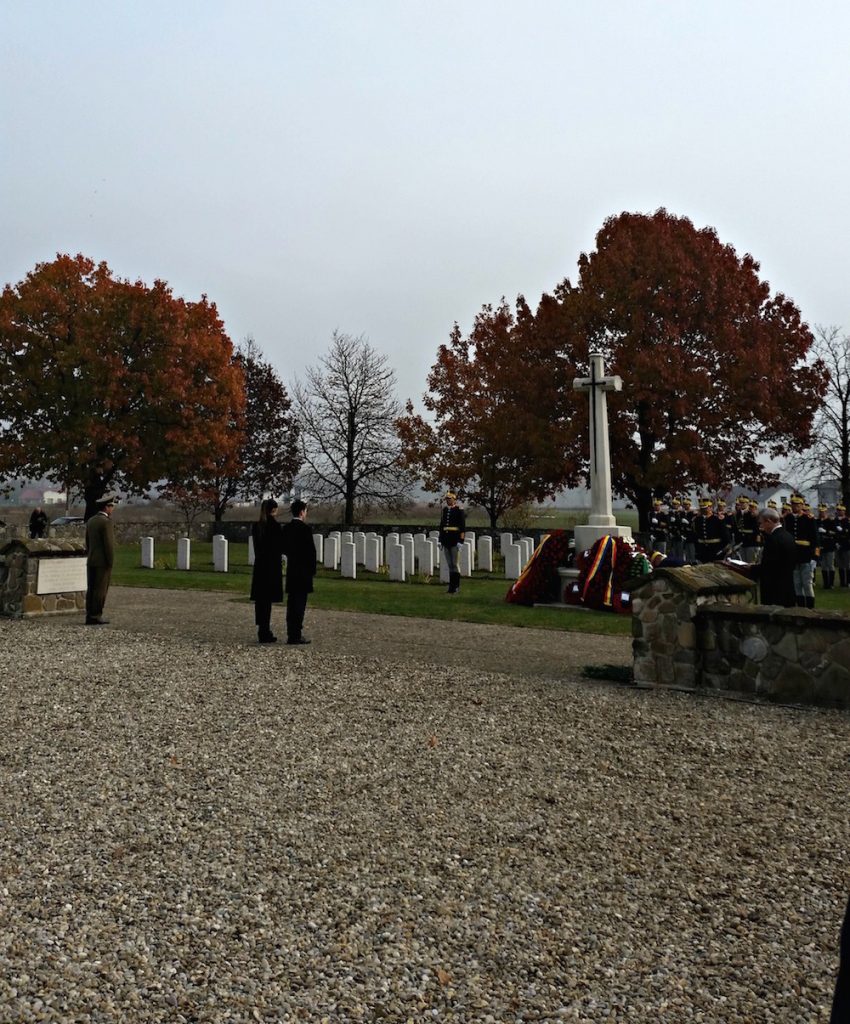
This year saw the biggest turnout of IBSB students ever at the annual Bucharest Marathon. In total of 72 students turned up on Saturday to run in the various age groups, with Mr Paul Georgescu and Ms Magda Camenidis there to lend a helping hand and ensure everyone made it to the starting line on time. In fact so many students turned up that IBSB was awarded the trophy for the school with the third highest numbers of student entries, which Mr Georgescu collected on behalf of the school
Special congratulations to:
Maria Roates—1st Place (5-6 years)
Alina Barbu— 2nd Place (9-10 years)
On Sunday it was the adults turn to take centre stage with the Students up against the Teachers. In the end it was the students who won the day, finishing 50/613 teams (a great result with students from the Primary school running), with the teacher‘s team placed a little further back, but still respectable at 318.
Well done also to Silvia Hewett for finishing the 1/2 marathon, to Rob Hewett for the finishing the full marathon, and to all the parents entered in the team and individual events.
Each year COBIS schools around the world are invited to send a student representative to the Student Leadership Conference hosted by Kings College Madrid. This year, Senior Prefect Adriana joined 29 students from schools from 9 countries, for a weekend of workshops and sessions offered from leading speakers on areas relating to the topic of ‘Student Leadership’.
On returning from the weekend, Adriana said it was a great experience and one that she would definitely recommend to future Senior School Prefects for friends made as much as the learning experience enjoyed.
On behalf of IBSB, we would like to thank our colleagues at King’s Group for organising this hugely successful event for the student leaders from the various COBIS schools and wish all students who attended good luck for this academic year, in their exams and their future.
To view more photos of the event, please visit the COBIS event Flickr page and Facebook page.
To view videos of the Student Leadership Weekend, produced by the students, please visit their YouTube Channel.
Saturday, September 13 saw a good turnout of parents and students for the annual Parent – Teacher BBQ, despite the threat of rain. In the end, however, the weather was kind to us, the grey skies lifted, the day lightened, and all present enjoyed a rich buffet of international cuisine brought in by the parents, with the chance to meet the teachers and staff in a social setting.
A special thank you to Alan Cornish for running an informative and well-received Primary School Presentation on developing a ‘Growth Mindset’ in the Primary School, which is a key focus for this year.
Thank you also to Aida Ivan for running the Child Safeguarding session – a requirement for all British Schools – which focused on issues relating to safety. If you missed either of these presentations, they are now available on the school website in the Parent’s Area. The next big social get together is the UN Celebrations on Friday, October 16. We hope to see all our parents there.
Following on from the Year 3D assembly last Friday, based on the International Day of Peace, the children generated lots of ideas as to how we as a school could celebrate this day. In the end, they decided what better way to mark this occasion on September 21st than to make the peace symbol involving every child in the primary school! During the afternoon break, each child made their way to the football pitch to join in the making of this symbol, becoming one in the name of peace. Peace One Day aims to advance active learning in the areas of conflict resolution, global citizenship, and human rights. We joined hands to unite in an effort to create the largest reduction of violence globally, as well as the largest gathering of children in the name of peace, on one day – Peace Day. It is our participation as a school and other schools around the world on Peace Day that will ensure the success of this historic event and contribute to the institutionalisation of Peace Day around the world.
The youngest children in our school met their new classes, classmates, and their new playground last week and since then they have all been very excited about all these new things and have shown curiosity about the many new activities they have enjoyed. They have learned to play together, they have already shared many nice moments playing with sand or water, and most importantly they all had a lot of fun! Let’s see what we have lined up for our youngest learners to explore next week.
The first day of school is always an exciting time as the teachers wait to greet their new students and the students and parents arrive to discover who their class teachers and Form Tutors will be for the year ahead.
This year BCR sponsored a special ‘Welcome Back’ banner, along with a professional photographer to capture the moment for those up for an early morning photo shoot.
As you can see from the photos the students were happy to be back. We would like to wish all our students, parents, and staff the very best for the year ahead, as we work together toward our Vision, ‘Building a Community of Passionate, Lifelong Learners.’
Our recent ISI inspection report said we have an ‘Exceptional’ School, so let’s make this an ‘Exceptional’ year.
And so it proved on the 14th June as 16 good men and women true met together at the Moara Vlasiei International Cricket Ground to do cricketing battle for the honour of the PTF trophy.
Teams were allocated on a somewhat random basis as we mixed staff, parents and students and ended with a harmonious compromise: all the ringers in one team and the ‘fledgling-newcomers-to-the-great-game’ on the other. The Student team, led confidently by Steve won the toss and chose to bowl and then Steve was told in no uncertain terms by his dad that they had changed their minds and wished to bat: so much for the sanctity of captaincy!
The Student/Parent team began at a gallop scoring quickly as the fielders struggled with two basic issues in the field: a) the ball is hard b) a spectacular full length dive for a catch counts for nought if you then drop the ball.
Nayva’s dad and Steve’s dad showed the two teams how cricket should be played and both retired at appropriate moments never having been threatened by the Staff pace bowling. Indeed Walter hit one ball so hard the fielders in the deep were taking cover and donning protective helmets as it sailed towards them. The Sequira offspring showed moments of sparkle at the crease but only briefly. The surprise package was the Hewett axis who accumulated loads of runs before one Hewett decided to cause a marital tiff by running the other one out. Ouch! Questions will be asked over Sunday dinner about that one: the classic cricketing call for a run had been heard, here in the depths of the Romanian countryside: ‘Yes!!…No!!…Sorry!” That combination of words has been heard on cricket fields from Adelaide to Bangalore and from Wellington to Old Trafford.
All that remained was a cameo from Ms Blessy and new cricketing devotee, Mr Silviu, who, without really realising it introduced the ‘Switch-hit’ into Staff/Parent/Student cricket.
Total: 125 from 20 overs.
The staff side began in effective style: Mr Afzal (A.K.A. Chris Tavare/Geoffrey Boycott/Michael Atherton), dropped anchor at one end and seemed to think it was a five day test match. However, the scorebook never lies and the redoubtable Shaikh was never winkled out by the bowlers: retiring unbowed in the last 2 overs.
The staff had some newcomers who struggled somewhat with the rigours of the bowling; Ms Andrea, Becky and Mr Storey & Ennion fought gallantly if briefly and were soon making the long lonely walk back to the sun umbrella. Cue the secret weapon: Andrew; the representative of ‘Cricket Romania’. He was given strict instructions by me in what I deem one of my finest inspirational talks: ‘Go in,” I said. “Hang around, strike out, Mister Afzal is not progressing us quickly enough… push on, Andrew, and drive us to the finishing line!!”
2 minutes later Andrew returned, out for nought with a rueful expression; “That’s cricket for you!” It said.
Afzal and I then tried our level best and with some streaky hitting and pure slogging we pushed us on to within touching of their total. We knew we were close because they stopped discussing their holidays in the South of France and Steve and Ken were brought back to: ‘bowl straight & keep them quiet!’ Ms Jane joined me at the crease for the final two overs but the run-chase was not quite to be. We fell tantalisingly short.
Heigh ho!
Staff 111: the dreaded ‘Nelson’ for those who know their cricket superstitions.
A brilliant game, terrific spirit, oven-hot but enjoyed by all. Many thanks to Andrew for arranging the event, the drivers, the parents & students but mainly my team…’We band of brothers and sisters…’
Well done!
P.S: Training starts in September!
“Cricket to us was more than play; it was a worship in the summer sun.”, Edmund Blunden
Paul Jennings,
Team Captain
A big ‘Well done ’ to the U9 and 13 football teams that took part in the annual Lumina Cup this year. Improving on last years results, the U13 boys came 1st in their group, with the U9 boys coming 3rd. Victor, Year 8, received a special award as goal keeper of the competition for not allowing one goal past the entire tournament, whilst Mihnea, Year 8, received player of the tournament. Andrei R., Year 2A, was the top scorer of the competition with 9 goals scored! A big ‘THANK YOU’ to PE Teachers Paul Georgescu and Ciprian Iacob for their support this year in running the afterschool football club, inspiring the next generation of footballers.
Congratulations to all the students in the IBSB Track and Field Team who competed in the Interschool Athletics Competition on Friday, March 27th, against a field of 8 other International Schools. Many of our students won gold, silver, and bronze on the day, with the boys managing to win 1st Place overall, with the Girls coming 2nd Place overall. A wonderful result achieved!
A special thank you to Paul Georgescu and Ciprian Iacob for their support in preparing the school teams.
The pinnacle of the week and term was without a doubt the Spring Show where 47 of our Years 4 to 6 demonstrated self-discipline, improving performance skills, a sense of humour, a joie de vivre and the result of many weeks of learning lines, actions, songs, in the very witty ‘Robin and the Sherwood Hoodies’ that captivated a large audience of all ages. The confidence, focus, independence, and awareness of how each part contributed to a whole on stage was evident to all those in the audience as we laughed our way through what was nothing short of a stunning performance.
Special thanks to all the students for all their hard work out in to achieve such a wonderful performance. A BIG thank you also to Mr Angel, Mr Ennion, Ms Andreea, Ms Broadhurst, Ms Oana, Ms Maddie, Ms Luiza, Ms Orla and last but not least, to Ms Hunter, this year’s director extraordinaire, who together achieved a something truly magical, with the support of everybody in the Primary School, as well as the parents who helped to arrange all the costumes for the night. It was a true community event, a celebration of talent and cooperation, and with the charity raffle (Thank you to all those who donated a gift for the charity raffle which raised 3650 ron for Sfanta Macrina) an opportunity to give to those who have so little. A great night all round, and one that will surely be remembered for quite some time to come. DVDs of the performance will be available in the weeks ahead.
The IBSB team achieved their target of going one better than last year, reaching the semi-finals of the World COBIS Debate Competition this year. The students all agreed that it was a tough competition this year – offering by far the highest standard of debating in the previous three years. The team have a lot to be proud of in beating the COBIS Debate Champions from the previous two years, BSN (The British School of the Netherlands), in the quarter finals, before eventually losing to tournament champions Edron Academy (Mexico), in their semi-final debate. Edron Academy went on to win the Competition, and were clearly the best team this year (they are the current Pan-American Champions and also recently won the World Schools Debate Competition).
Congratulations to all five members of the senior school debate team, Sebastian, Andreea, Vladimir, Zoe, and Andrei, as well as to our team coach, Mr Afzal Shaikh. Added to Sir Winston Churchill Classic trophy collected earlier this academic year, it has clearly been a very good year for the school debate team.
Day 3
The third day of our Istanbul Trip was packed with negotiations and debate on resolutions and clauses. Each of our students managed to not only propose, but also pass from at least 1 clause to over 13 clauses within their respective committees. To put this in perspective, a typical MUN resolution has somewhere between 6 to 10 clauses. Some of our students were the main submitters of resolutions.
To give you a glimpse of a flow of negotiations, Steve and Zainab were representing Oman in the Arab League and one of their three topics was on “ending state sponsored funding of terrorist groups in the MENA region”. The resolution debated on this topic was mostly founded on the primary notion put forward by Oman: the creation of a Terrorist-Response-Team (TRT) that is comprised of, managed, and monitored by the Arab states. Oman proposed 13 clauses out of a total of 15 on this topic. They tackled constant questioning, particularly pointed ones came from the representative of India (who was a guest in the Arab League), who tried hard to de-rail Oman’s proposals. However, our students used multiple strategies to stay ahead of the game (they used the official notepaper to get other countries on their side, got other representatives to give speeches supporting Oman’s proposals, and maybe some other more tacit strategies). Defending one of Oman’s clauses, Zainab said: “the clause is about building a strategy that thinks 4 steps ahead – reaches victory faster with less lives lost”. Oman also suggested the organisation of a meeting in the Kingdom of Saudi Arabia; one that would invite the extremists to the table. They justified this suggestion with the argument that as ISIL calls itself a Sunni extremist, and as Saudi Arabia has a Sunni majority governed by the Sunnis, they may be able to draw ISIL to a discussion on the religious aspect of the issue at hand. Besides clear support for their ideas, the representative from Palestine for instance thanked Oman “for creating a political platform and presenting a suitable solution that is greatly favourable for all within the Arab League”. With all the commotion and debate, the end to this story of state-sponsored terrorism was all the more fascinating! The Arab League along with our Oman representatives colluded to eventually dissolve the resolution they worked on all day! This collusion was fascinating, and sent shock waves through the committee, with some members outraged while others enthralled. The game was very well played, and the representatives of Oman, along with their close allies on this issue (Djibouti – because they too had strong speakers) set the pace of the session to serve the interests of their country on this issue (neutrality, brotherhood, and participation without any significant disruption of ties – particularly with key partners such as the Saudis). This was just a snapshot of one part of the discussions on one out of 3 topics.
This same level of enthusiasm and rigour in debate and negotiations was visible also in the Security Council where two of our students (Maria and Sebastian) were representing the USA.
Day 3 was wrapped up with a party on campus organised for the students to socialise and strengthen their newly formed friendships.
Day 4
While our students in the Security Council and the Arab League continued with their debates within their respective committees, Day 4 saw the developmental committees in their national caucuses, which is a unique feature of this particular MUN conference.
In the national caucuses, the students of individual countries go in to discuss the various resolutions that were agreed upon in various committees. It enables all representatives of a given country to pool their ideas and commitments made in different committees. Three of our students are in these developmental committees (Catrinel, Sofia and Achille: all three represent France).
They then discuss and negotiate upon international commitments within an international summit that brings together all the delegates from all developmental committees. Achille, being the ambassador of France is expected to take a lead and guide the negotiations on behalf of France. As this is the last day of the conference, the students will receive their certificates of participation and T-shirts in the closing ceremony. Since the THIMUN format of MUN conferences are trying to minimise aggressive competition, and are trying to encourage collaboration (in the spirit of the UN principles), they have removed the possibility of earning individual certificates based on merit or strengths of arguments during the conference; as such there will not be any certificates of excellence given out in this conference.
Tomorrow we intend to conduct a final sight-seeing tour of the Grand Bazaar and possibly visit Taksim Square for much needed relaxation after the long days of negotiations.
Day 1
The MUN team attending the conference in Istanbul have settled into their respective committees. The first day of our stay was dedicated to a student and cultural exchange experience. Each of our students had a unique insight into aspects of life in Istanbul. While some host families took our students to visit the buzzing Taksim sector, other groups explored the local markets and hit the big malls of Istanbul. From dog-walking to jogging, shopping to sight-seeing, they all spent the first day settling in with their hosts. I am sure the students will be happy to share quirky stories when we get back.
Day 2
Day 2 started with an early morning tour (some of us woke up as early as 5:30 am) of some of the key spots in the European part of the city. All the international delegates had a guided tour of the Blue Mosque and Topkapi Palace.
Our group then took a brief detour to take a unique photo-shoot in traditional Turkish costumes, which the students thoroughly enjoyed.
After lunch, we embarked on a one-hour guided ferry cruise on the Bosphorus strait, going from the European to the Asian part of the city. Though just last week the city was hit by snow storm and schools were closed, we had great spring weather, making the boat-ride very enjoyable for everyone. For a sneak-peek, I have attached just a few of the amazing pictures taken by Mr Nastase.
After the relaxed tour, our students switched gears and got into their formal MUN mood for the opening ceremony that was organized at the Koc school auditorium with 600 delegates from 40 schools. The main guest speaker at the opening ceremony was Mr Faik Uyanik, the Communications Officer at UNDP, Istanbul. His opening speech gave the students some perspectives on UNDP’s plans on tackling key developmental issues at the global level. It was fascinating for instance to hear about the 16 SDGs (Sustainable Development Goals), which will be the successors of the MDGs and how they will be monitored with over 169 global targets: a massive jump from just 8 MDGs, which have not been fully met at the global level. The second guest speaker was Dr Belgin-San Akce, a professor of international security and conflict resolution, who specifically addressed issues in relation to the Middle-East, which is the over-arching theme of this conference. While they both lamented about how “no democratic state can afford too many coffins coming home”, they both stressed that increased commitment particularly in investments is needed to fight the strong-hold of terrorist groups such as the ISIS which have usurped several regions and states in the middle-east. The students were urged to exercise leadership, engagement, and partnership in their debates and negotiations.
Following the opening ceremony, we attended the diplomatic dinner at the Divan Asia Hotel, after which students returned to their host families, to catch some sleep.
Day 3
The start of this third day has seen an active participation from our students. Achille, being the Ambassador of France, gave an opening speech at the General Assembly, while Catrinel and Sophia openly questioned the commitments of Saudi Arabia and Yemen, pointing out the fallacies of the promises made by their respective ambassadors. Zainab, representing Oman, is already taking the lead within the Arab League to guide the lobbying in her committee.
More news to come 🙂
Each month at IBSB there are Parent Workshops offered to help support parents in the process of raising their children. There are works for parents in EYFS and Key Stage 1, run by Manuela Constantine, on the Second Wednesday of each month, 8.45-9.45am, and Whole School Parents Workshops run by our Student Counsellor, Aida Ivan, which take place each half term on a Monday, 4.30-5.30pm. Tea and coffee is provided and there is always time at the end of the presentation for questions and answers and a friendly chat with the teacher and other parents.
Some topics coming up in 2015:
Feb 11 Building Resilience in Young Children
Feb 23 Effective Communication – Tackling sensitive issues (death, divorce, sexuality, etc.)
Mar 30 Moral dilemmas for children/teens – Case studies
Apr 27 Challenges in modern parenting styles
May 25 The future of my child – career education at home
If you are interested in attending one of these workshops, please email:
Our students were focused and passionate in their final preparation debate against the International School of Bucharest on Monday. They debated both the ISB Junior and Senior Teams on the subject of whether violent video games should be banned and whether nuclear weapons should be banned on or not.
Good luck to the team at the COBIS World Debate Championships this coming weekend.
Every year the students in both the Primary and the Secondary school prepare and give speeches in front of their class, with the best speakers going on to compete in a school final. From here the best 8 students are selected to go on to compete in the regional ESU Public Speaking Competition, which this year included students from some 25 schools across Bucharest.
Public speaking is an important part of the IBSB program, helping to develop confidence and an important life skill, and in so doing providing students with a challenging experience and a real sense of achievement.
The final IBSB placements from the regionals are as follows:
Honourable Mentions: Ana Cristescu (Year 6), Melissa Aydogan (Year 6), Meea Stanca (Year 6),
3rd place prizes: Maria Sticlea (Year 5), & Aryan Agarwal (Year 5),
2nd place prizes: Shashwat Kumar (Year 6), Matei Atimariti (Year 6) & Beatriz Souza (Year 5).
All 8 of our students were placed in the competition and as such deserve a big congratulations!
A special thank you to Mr Ennion and Ms Hunter for preparing the students and to Ms Hewett, Ms Jones, and Mr Peet for helping out on the day.
Burns Night, on Saturday, January 24th, saw some 40 odd IBSB students, staff, and parents don their social best and head out for an evening to celebrate Robbie Burns, the famous Scottish poet, and all that is Scottish, including haggis, Scottish refreshments, and dancing. Mr Peet opened up the evening with the traditional reading of the Selkirk Grace, Mr Hewitt joined the procession bringing in the haggis, and Ms Jones read out some excerpts from Burns in presenting the perfect image of a Scottish man, complete with all his imperfections. We ate, drank, and danced the night away, with everyone leaving feeling imbued and enlivened with the Scottish Spirit.
Thank you to Stan and Camelia Platt and the entire Light into Europe team for organising such a wonderful night for everyone, and to Claudia Marta, our PTF president, for rallying the troops to ensure a good turnout from IBSB for what is without a doubt a very worthy cause- developing the Romanian Guide Dog Programme. If you are interested in working with Light into Europe to support their guide dog programme, please contact Stan Platt, st*******@*************pe.org.
Following their success in winning the Sir Winston Churchill International Schools Debate Competition before Christmas, students of the IBSB debate team have been busy practicing their debate skills for the upcoming COBIS World Debate Championships (to be held 6-8 February), by participating in practice debates with other International schools. Topics include Globalisation, International Cooperation, and Free Speech. Here are photos from last week’s practice debate with BSB, debating whether the criminal justice system serves justice.
On behalf of the staff, students, and indeed the entire IBSB Community, we would like to congratulate Head Girl, Ruxandra Rogojinaru for being offered a place at Gonville & Caius College to study History in 2015-2016. Congratulations Ruxandra! It’s nice to see that hard work does pay off.
Ruxandra is the current Head Girl at IBSB, recipient of the COBIS Award and a special MUN Award, and Editor of the School Magazine, with an A-A* average at both IGCSE and A Level.
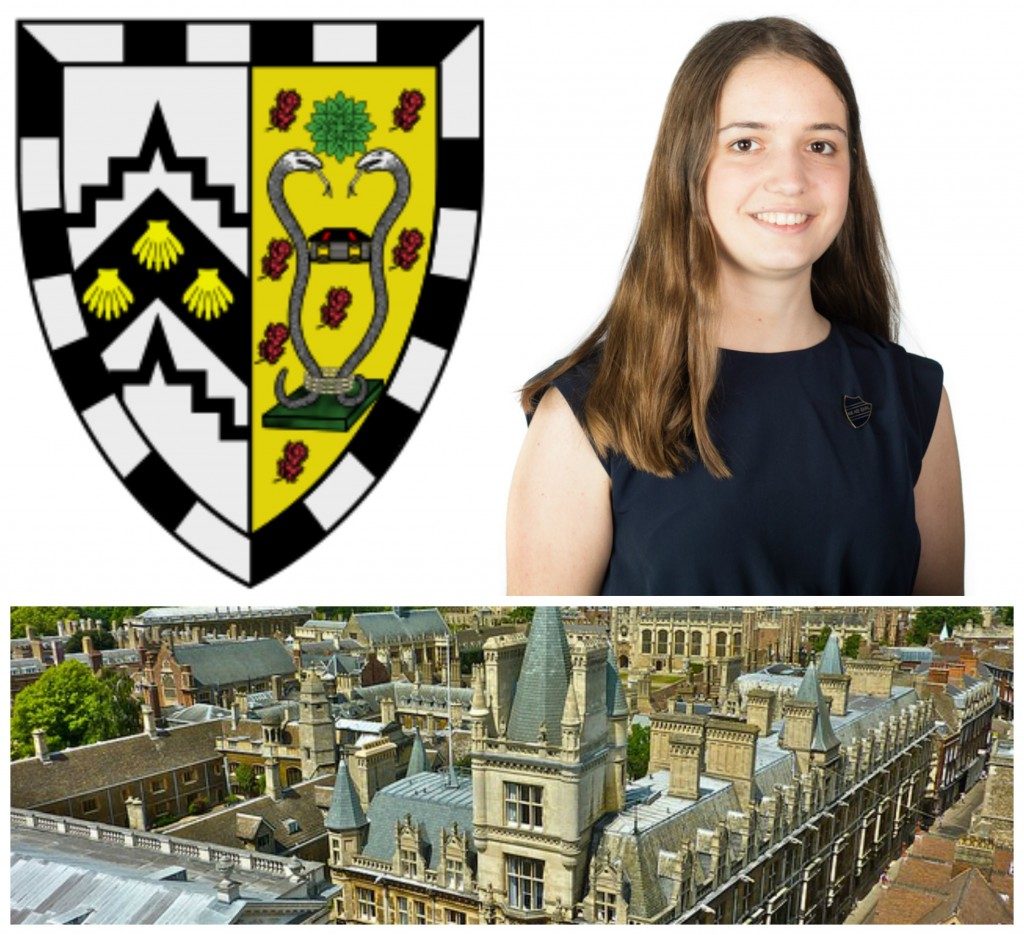
IBSB took away two teams to the inaugural International Schools Girls’ Football Tournament, on Saturday, January 17. Although our teams were newly formed and relatively inexperienced, their abounding enthusiasm served the girls well as they played against some well-trained and organized opponents.
Interestingly, the most memorable game came when IBSB A team played against IBSB B team. Our A team thought they had sealed victory before the B team scored an equalizing goal in the dying seconds to for a well-earned 1-1 draw. And in the final game of the day, IBSB’s B team played incredibly well to earn a 0-0 draw with ISB.
Ms Becky and Mr Ennion both said they left the tournament feeling very proud of the girls’ achievement, noting we have two superb goalkeepers in Melissa and Meea, two reliable defenders in Lara and Kathleen, and also some skillful midfielders in Alina, Elian, and Kiki. They would also like to remind all the girls that the Girls Football Club will start again in the summer term.
Thank all the parents who came along to support, and especially Deva (Pre-School) who was the biggest IBSB supporter on the day.
On behalf of the staff, students, and indeed the entire IBSB Community, we would like to congratulate Catrinel Vlad for receiving an unconditional offer to Yale University. Every year over 100 students from schools around Romania apply to Yale, with only 1 or 2 students accepted each year, and as such this is incredible achievement for Catrinel, paving the way for other IBSB students to follow.
Catrinel was Head Girl, School DUX, recipient of the ECIS and COBIS Awards, and Captain of the School Debating Team, achieving A*A*AA in her final A levels.
We would like to congratulate the Sixth Form IBSB students involved in the Cartile Copilariei Project for successfully raising 1000 RON from their winter stall and silent auction at the Winter Show and from online donations, allowing them to donate 65 books to the children reached by the programme.
We would also like to thank BCR for their generous donation of 5000 euros, kindly arranged through Ms Claudia Marta, the President of the Parents, Teachers, and Friends association at IBSB.
Thank you to everyone who contributed to our cause. We wish you had a great holiday and Festive New Year. May all your wishes comes true in 2015.
A BIG thank you to all the students and supporting staff for putting on yet another great Winter Show this year, which took place at the Tandarica Theatre on Friday, December 12th. The EYFS Carols, the Key Stage 1 Play ‘Christmas with the Aliens’ and the Secondary School Eclectic Compilation of shorts entertaining Skits were all warmly received.
Thank you also to the many parents who donated food for the PTF Bake Sale and/or something for the Winter Show Charity Raffle. In total over 3000 lei was raised to go to the Student Council who will allocate the money to the various CAS projects. 5000 euros was also donated on the night by BCR to the Curtea Veche Community Project to help raise literacy levels in poor communities throughout Romanian by ensuring children in these areas have access to books.
All in all, a night very much enjoyed by all and a lot of good achieved for the local community.
For the second time in three years the IBSB Debate Team brought home the Winner’s Trophy from the Sir Winston Churchill International School Public Debating Competition. Debating Transylvania College (Cluj) in the final, arguing the side of the opposition for the motion “The House believes that money spent to host an international sporting event, such as the Olympics or World Cup, is a worthwhile investment”, Team IBSB, consisting of Zoe S.(Year 13), Andrei D. (Year 12), and Vlad S. (Year 12), built a convincing argument weaving together a mixture of historical fact with more recent current events to achieve a well-deserved 4-1 victory. Guest Judges for the Grand final included:
HE Ambassador Corr praised the international schools involved for the focus placed on debating skills and described this as an extremely valuable training in the use of persuasion and influence which can be a lifelong personal asset. The Ambassador said the growth of debating in Romania and elsewhere is an indication of the need for presentation skills in public outlining of points of view and perspectives and the Sir Winston Churchill debate showed the very high debating skill of all the schools involved.
HRH Prince Nicolae shared the following with all present in the closing ceremony:
The importance of debating is an invaluable skill that students during their school years will find challenging, exciting and rewarding. To be able to debate a topic that is prepared only moments before being tested by the opposition or proposition and having the skill to think on the floor and respond from the information gathered as a team is an invaluable lesson, skill and reward that will no doubt serve the students well in their future lives carrying them forward in their successful careers.
For the second year I have sat on the panel of judges where, and once again I have been impressed by the standard and quality that has not only reflected the depth of thought given by the participants, but also cause those present to take pause and reflect. Congratulations to all the participants and the finalists.
From the entire IBSB Community, we would like to say congratulations to the entire team, including Luiza R. (Year 9), with a special mention to Zoe S., voted as the best overall debater in the tournament.
A special thank you to Ms Blessy Savu and Mr Afzal Shaikh for all their work in preparing the team for this competition.
In February our debate team again draw their swords as they head to the COBIS World Debate Championships, and our hopes and best wishes go with then as the begin preparations for this event.
Last Season’s Champions, the IBSB U11 Team are off to another good start this season with yet another win under their belt. Up against the ISB U11 Team this week, IBSB showed they are still a force to content with, winning their game convincingly 5-1. Well done to Paul Georgescu and the team. We wish you well in your future games.
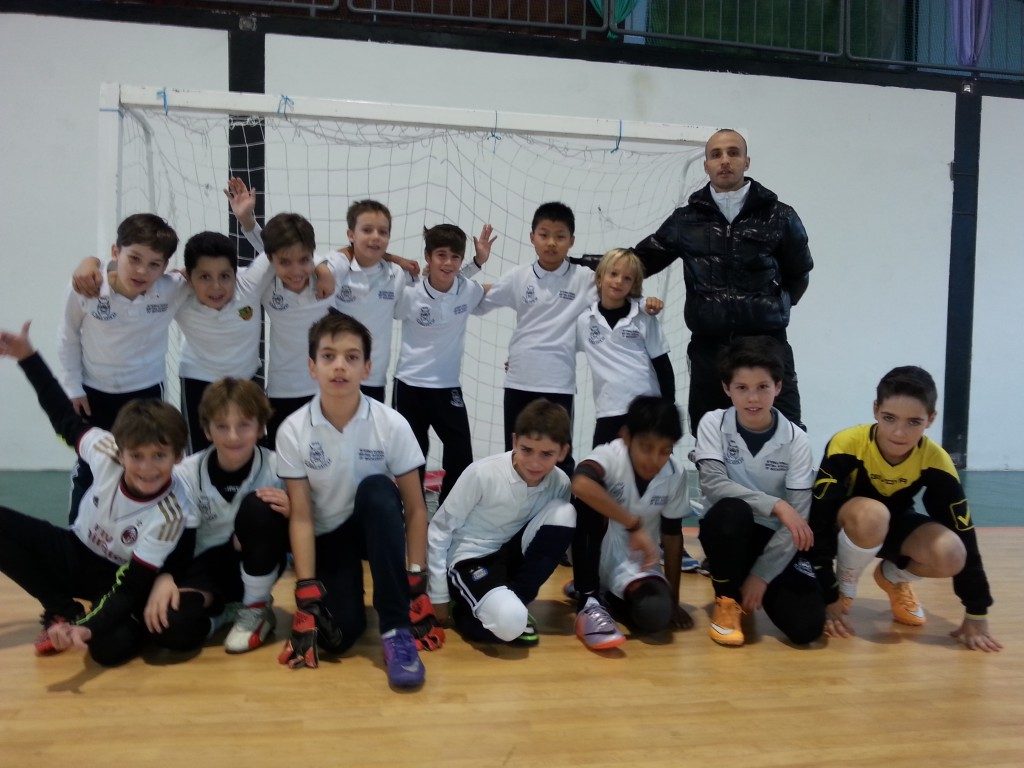
This week a number of students at IBSB were treated to very special visit from a wonderful Scottish music group over from Inverness for the Caledonian Ball, who took the time to stop by to offer a concert in the Primary School during the their Monday afternoon assembly, and to run a Scottish session for the students from Key Stage 3. The musicians Fiona, Mischa, Conal and Innes won the BBC Radio 2 Young Folk Award earlier this year (See www.mischamacphersontrio.com) and so it was an honour to have them as guests at IBSB.
We would like to say thank you to Stan Platt and the Light into Europe Charity for making this visit possible. It was a truly enriching experience for all the students and staff and we are already looking for to the next Light into Europe Ball- The Burns Supper- on Saturday, January 24th.
Saturday the 22nd of November saw a swath of IBSBers don their finest for the annual Light into Europe Caledonian Ball. The event, to raise money for the Romanian Guide Dog Programme, was hosted again this year at the Intercontinental Hotel, by our very own Sir Stan Platt, with British Ambassador, HE Mr Paul Brummell and Irish Ambassador HE Gerard Corr present amongst others, along with several tables of IBSB students, parents and staff. Eight IBSB students performed a number of Scottish Dances to the delight of all present, and even our very own Head of School, Mr Peet got involved, donating his collection of world No. 1 signed tennis balls to the charity raffle. All in all, a good night was enjoyed by all present, complete with good food, good company, and a fun night of Scottish dancing.
Next up on the social calendar is the Light into Europe ‘Burns Supper’, taking place this year at the Hilton on Saturday, January 24th. We hope to see many students and parents present once again for what promises to be another great night out.
Witches and Warlocks, Ghouls and Ghosts, Princes and Princesses, and of course the ever popular Grim Reaper, Dracula and his trusty Vampires were the popular choices of the night for this year’s annual IBSB Primary School Halloween Party, which took place on Friday, October 31st, at the Kiddo Play Academy Baneasa in Baneasa Mall.
Without a doubt it was our most successful Halloween Party ever, thanks to the tremendous efforts of the PTF, with almost the entire Primary school present, as well as most of Year 7 and a good portion of our Year 8 students. There were fun and games planned for the evening, food and drink available, a Fancy Dress Competition and the announcement of this year’s Pumpkin Contest, all of which made for a very exciting and enjoyable night for all present. Even the parents got in on the act, with Stan Platt dressed as a Wizard, Mr Zamfir a rather dashing Pirate, and plenty of witchy mothers present to add to the flavour of the night.
A big thank you to the PTF and especially PTF President Claudia Marta for all the hard work put in to make this event the success it was. Thank you also to Wilhelmina Arz for her help in selecting this year’s winner of the fancy dress competition, to KIDDO Play Academy for graciously hosting us, and to BCR, Nikon Yellow Store, and Dacris for sponsoring the photographs and prizes for both the fancy dress and pumpkin making competitions. Finally, a big thank to the IBSB Students, Parents, and Teachers who came along for the night, together making it a memorable night for all. We hope you enjoy the photos and look forward to seeing you back again next year.
Friday, October 17, saw the IBSB Community welcoming Mr Adam Sambrook, Deputy British Ambassador, along with a number of international and Romanian schools on to campus for the annual IBSB United Nations Day Celebrations. The day was a celebration of all that is truly international, with an international buffet lunch provided for students, parents, teachers, and guests, followed by a live performance programme with acts from around the world. It was also a day dedicated to the idea of community and international cooperation- people working together for a common good- which is central to the IBSB curriculum and approach to education.
We would like to thank Mr Sambrook, DSBU, Avenor College Scoala 64 “Ferdinand”, the students from Fundatia Sfanta Macrina, the various charities and community partners who had stands here on the day, and Borsec who kindly supplied the refreshments, for all your support as your combined involvement made the day truly special for everyone present BCR,Cărți, Dulciuri și Flori, The Little Gym Bucharest, DENT Estet 4 Teens, Light Into Europe Charity, Prior Books, Magiun de prune Topoloveni , British Council Romania.
Now entering their third week, the students from IBSB are moving from the putting range to the driving range, as they develop their various golf strokes in the new IBSB Golf Club.
The IBSB Golf Club will continue up to the end of November and will restart again in April, with more opportunities for other students to join.
It is said that there are more business deals done on the golf course than in the board room, and as such learning to play golf may prove to be as important for the future business success of our students as learning mathematics and economics.
Education is all about looking at the bigger picture.
We would like to thank all the parents for their kindness and generous donations for Sfanta Macrina this term. Many of you appeared with bags of clothes, stationary, shoes, jackets and toy for the children and young people of Sfanta Macrina. Year 5’s classroom looked like a charity shop with the variety of bags and goodies on offer. Last week, Ms Katie and the residential children of Sfanta Macrina came to school to choose for the selection of clothes and stationary, walking away with many bags. This week, the remaining clothes and bags were sent round to Sfanta Macrina to the delight of many more children.
We would like to thank you all again for the kind donations you gave in and we hope you know they have gone to a good home.
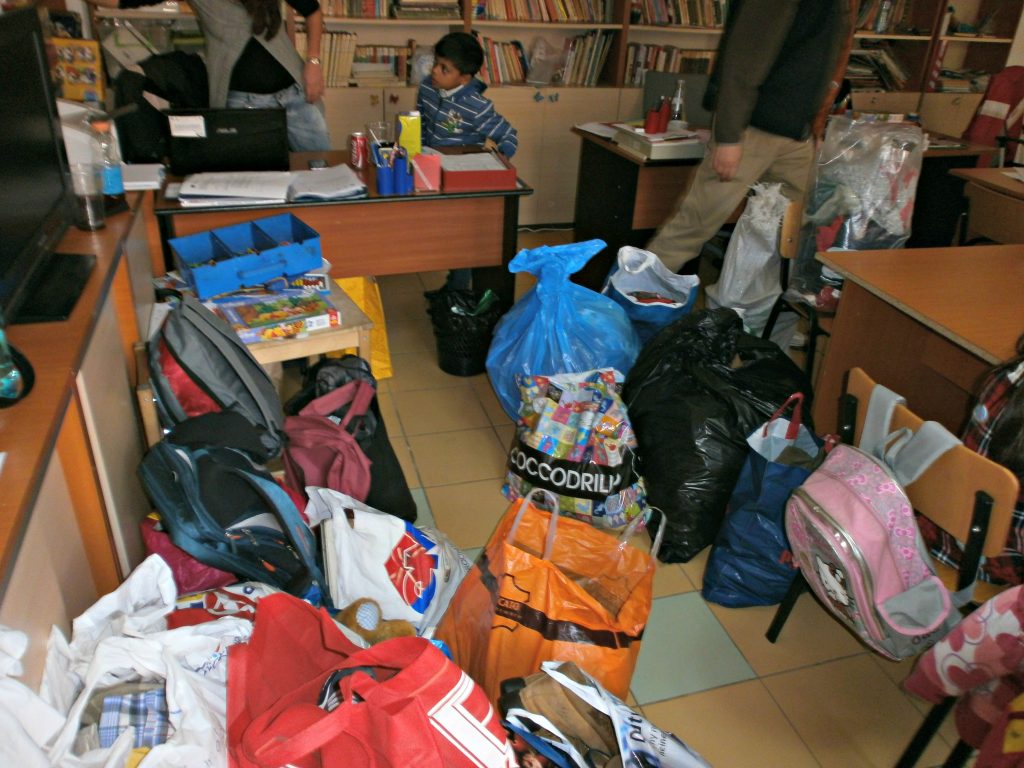
On Saturday, September 27th, two IBSB students, Steve and Alin, Year 12, received their DofE Silver Award at a special Royal Gala Award Ceremony at the Hilton Hotel from HRH Prince Guillaume of Luxembourg and HRH Prince Nicolae of Romania, along with other 20 students from around Romania. Accompanying our students for the ceremony was Ms Johanna Croci, IBSB DOE Programme Coordinator, with parents present to share the moment. Congratulations to both Steve and Alin for their wonderful achievement, leading the way forward for other IBSB students to follow in the years ahead.
On the 21st of September every year, over 2 million people celebrate International Peace Day. Peace One Day is an organisation working with global leaders and celebrities to bring a day of ceasefire and non-violence, allowing humanitarian aid to reach children and adults in need.
This year on Friday the 19th, IBSB joined schools and communities around the world to recognise this wonderful day of peace. The Primary and Secondary school joined together for a minute of silence, before releasing 350 white balloons into the sky, each sending a message of peace. Then later the same day Year 5 presented a memorable assembly on Peace Day. It was a wonderful day, with many happy thoughts and good wishes shared. We hope everyone had a peaceful weekend and that these peaceful thoughts last with us all year!

This morning 10 students from Year 10 headed off for a 1 week adventure in the great outdoors as an introduction to the
Duke of Edinburgh’s International Award Programme.
The Duke of Edinburgh’s International Award Mission is “To inspire, guide and support young people in their self-development and recognise their achievements” directly in line with the IBSB Mission “Working together to Inspire, Support, and Celebrate student achievement”
Over the course of the week the students will have the opportunity to face personal challenges and develop teamwork and leadership skills whilst completing a number of activities, including a track to the top of Mt Omu and an overnight camp under the stars.
We wish all our students and the two accompanying teachers, Ms Katie Bickell and Award Leader and Assessor Ms Johanna Croci blue skies overhead and many happy memories along the trails they will be walking.
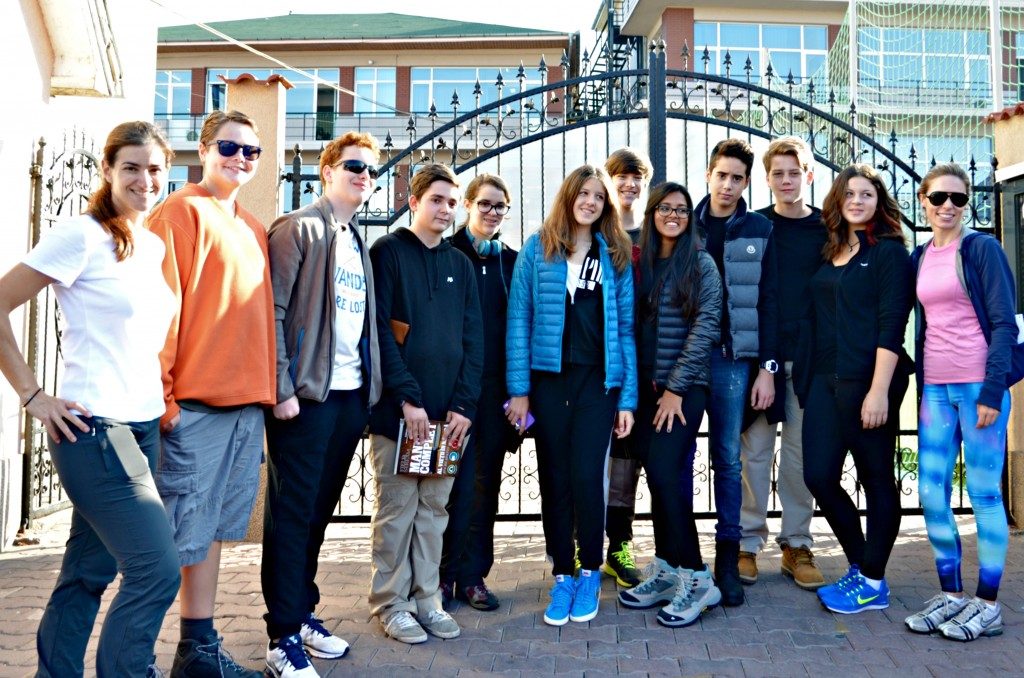
Last weekend IBSB students and staff took part in the annual Delta Triathlon in Tulcea. Mr Georgescu trained and organised the team, including eight students and three members of staff. The weather was fantastic and the children were in high spirits as they swam150 meters, ran to the transition area to get their bikes and cycle 2.7 Km (7-9 years)/ 5.4 km (10-11 years) , before dismounting for the final 500m / 1 km run. All our athletes managed to finish their race in very good time, with Alina B. (Year 4) coming second in 7-9 years-old race. Well done to everyone, including Patrick and Philip K., Anton and Ana Maria Z., Andrei M., Isabel D., Alina B., Andreea A., Mr and Mrs Hewett, and of course Mr Georgescu for an excellent competition!
At this year’s graduation and end of year award ceremony we were honoured to have three guest speakers: the Vice Rector of Carol Davila University, Professor Dragos Vinereanu, His Excellency the Irish Ambassador, Mr Gerard Corr and HRH, Prince Nicholas of Romania. Their speeches on working in the field of medicine, internationalism and the importance of not believing in failure were an inspiration to us all.
Congratulations to all the Graduates of 2014 and to the Senior School Award Winners, acknowledged for their academic results, for their involvement in community projects, and for their outstanding charity work and engagement in extra-curricular activities.
Taken together – the Award Ceremony, the speeches, the musical ensemble performed by Steve (Yr 10) and Anemona (Yr 13), backed by our very own Mr Militaru, the graduates’ speeches, the laughter, the tears, the photos and live media interviews, the food, wine and champagne- it was a very full night, with many happy memories surely to remain in the minds of all those present for that brief but important moment in time. To those moving on this year, you will all be missed greatly – to be perfectly honest, the school will not be the same without them.